Yacht Crew Salaries
Average starting salary guidelines.
The crew salaries reflected below have been derived from placement records and job orders for both power and sail, reflected as an average, received by Crewfinders within the past year and may change without notice.
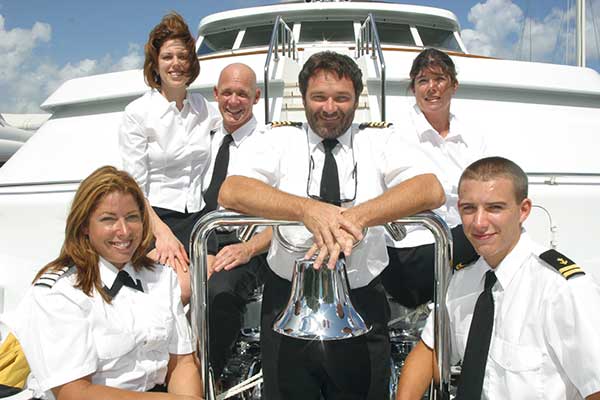
- Yachting for beginners
- Owning a yacht
- Motor Yachts
- Sailing Yacht
- Indian Ocean
- Mediterranean
- Buying or Selling a Yacht
- Yachting Events
- FAQ – Luxury Yacht Charter
- FAQ – Buying a Yacht
- FAQ – Sell your Yacht
- How Much Does It Cost To Charter A Luxury Yacht?
- All our Blog Post & News


Yacht crew positions : Hierarchy, Missions & Salaries explained
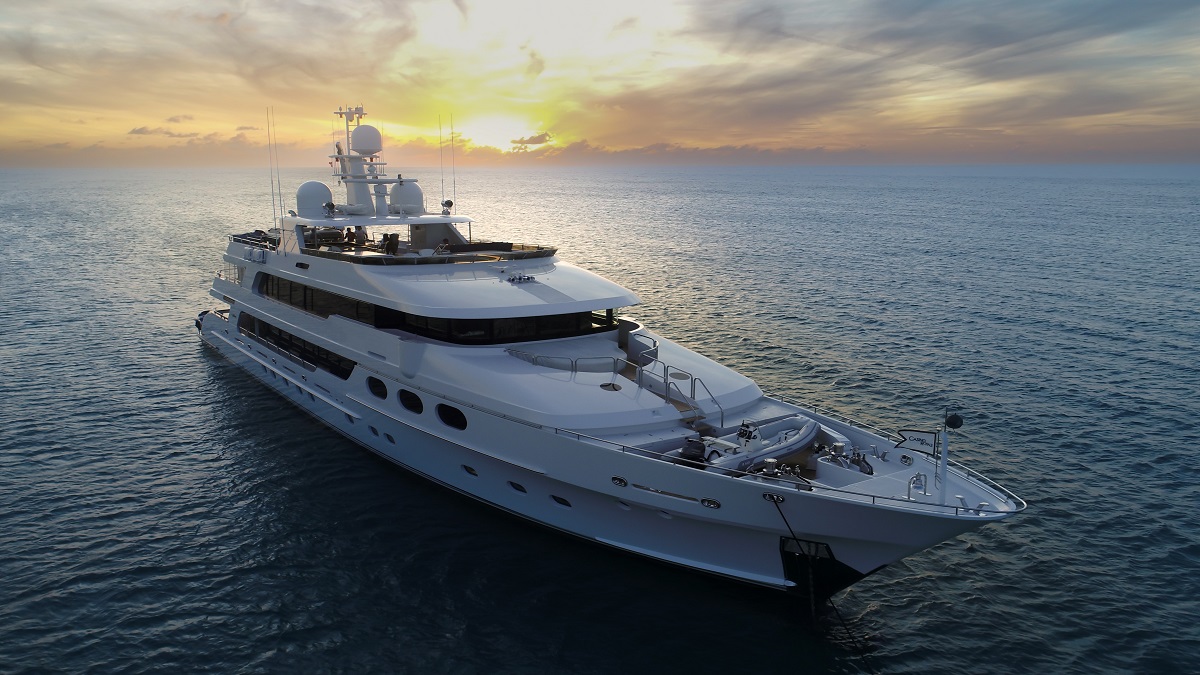
Like any well-run hotel, restaurant, or other luxury service, a crewed yacht needs organized structure and good management. Whether you’re staffing your own luxury vessel or looking for an exciting career working and traveling the world, you need to know how this structure works, and what you can expect to pay or earn and do in the various roles on board.
Every yacht is a little different, and organization may reflect the style of the captain or the demands of the owner. But the same jobs need to be done on almost every boat. Organized with ranks, heads of each division report to the Captain. It’s not a military-style organization, but there are parallels with merchant marine grades and structures.
Smaller yachts need fewer crew, and staff may wear multiple hats that cross more traditional divisions and may combine some jobs with others. Large yachts have more distinct divisions or subdivisions, with more specialization to divide tasks and manage staffing. The core skills are the same, but finding staff with the right blends to do the jobs is key. Crew with broader skills are highly sought after.
As a yacht owner, you shouldn’t have to worry about day-to-day management decisions or organizing all this. That’s why you have a captain, and it’s better to leave staffing decisions entirely up to him or her. But it’s still important to know what it is people you’re hiring do, why they’re there, and how many you need. You don’t want too many crew, or to be short-handed. An understanding of what your yacht needs helps you talk to the captain to keep your yacht running how you want it.
For those looking to break into yacht crew work, consider your skills and strengths, and what jobs appeal to you. You’ll need training before you work, and you can direct your job path through the training you seek. Your goal is a suitable position on a well-run yacht, so make yourself the most attractive candidate possible.
Yacht Work Life
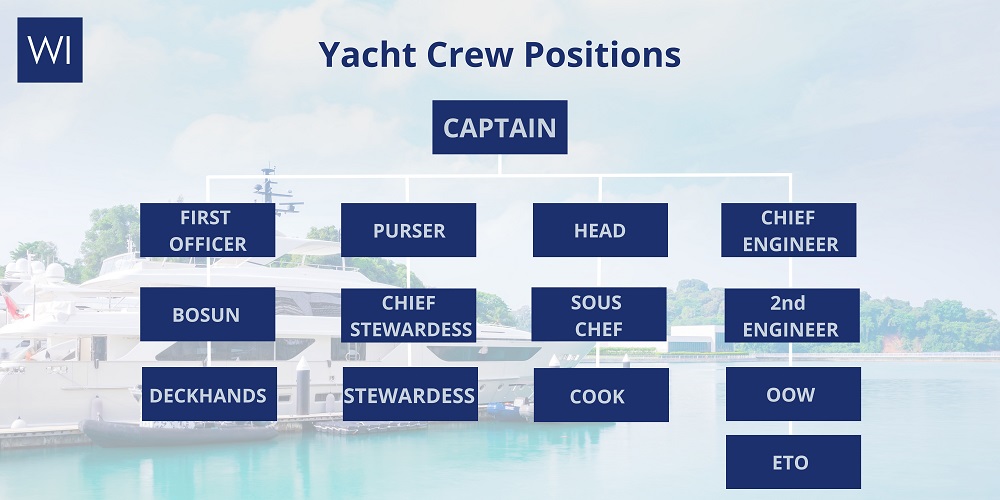
Working on a yacht is also living on the yacht. Crew must have a space to sleep, food, and all the basics that any employee needs. Large yachts have space reserved for crew, and owners looking for quality crew should provide good working and living conditions. Your crew takes care of you, and you should take care of them.
Depending on where a yacht operates or what flag she flies, a variety of labor laws or rules may be in effect. These requirements may be for work visas, contracts and written agreements, and compliance with merchant and ship crew treaties and laws. Be prepared to have work and non-disclosure agreements between yacht and crew, though a few yachts skip this.
Seasonal Jobs
Many yacht positions are seasonal. Year-round employment is more likely for senior crew like the captain and department heads, but not all yachts see year-round use. And some yachts may use different crew in different locales between seasonal moves.
Any job listing should give seasonal information, with geographic information, the length of the season, and the prospects for year-round positions and repeat employment.
Hours, Salaries, and Expectations
Yacht crew is a service job at its core, and every yacht owner is looking for service-oriented people who understand how to deliver a hotel-quality living and restaurant-quality fine dining. Work experience in luxury hotels and restaurants is a big plus for some jobs, and makes breaking into yacht work easier.
Yacht work can be very demanding, with periods of intense work when the owner and guests or a charter party is on board. Long days aren’t uncommon, but often balance with slack time when the boat is empty of passengers. There is always work to be done, but there’s usually a chance for time off.
Most salaries are monthly, since many positions are seasonal. Pay ranges are commensurate with experience, rank, and responsibility. Private vessels usually offer higher base pay, as charter crew can earn tips on top of their base salary. Because of the demands of the lifestyle, compensation is good and you have minimal living expenses on board.
Benefits and Time Off
Because so many jobs are seasonal and may occur in different countries and locations, benefits offered to yacht crew vary widely. But it is not uncommon for crew to be offered health and accident insurance and a flight to the vessel. Living on board, you’ll get food, rooming (usually shared), basic toiletries, uniforms, and laundry. Yachts with a longer view may offer additional training to long-term prospects.
Time off is usually linked to boat use, and may be sporadic in-season or when the boat has the owner and guests on board. There will always be some time off, but it may be between very intense work periods.
Most crew jobs have an employment contract that meets the Maritime Labour Convention 2006 (MLC). This should spell out the contract period and duration, as well as salary, leave and time off, probationary periods, repatriation policies, and any other crucial details to meet the minimum international standards of crew welfare.
This contract should also contain shipboard policies on confidentiality and non-disclosures, drug and alcohol use on board, personal hygiene expectations, interpersonal relationships, and dispute resolution. Job expectations and requirements can also be included, with specific language about roles, tasks, and cooperation between divisions.
Note that all crew agreements will explicitly prohibit drug use on board, most limit alcohol consumption and ban hard liquor on board, and many boats have policies prohibiting intimate personal crew relationships. Because the crew is living on board full time and in close quarters, rules to maintain decorum and crew harmony may be in writing.
Training & Certificates
Two key certifications are required for yacht crew. Employers look for the STCW (Standards of Training, Certification and Watch-keeping for Seafarers) and the ENG1 (Seafarer Medical Certificate). Insurers generally require crew to have these two certifications or the equivalent.
The ENG1 isn’t a class. It’s a medical exam to ensure that the crew is physically fit to serve at sea and has no underlying conditions that may arise far from help. It’s best for prospective crew to secure the ENG1 before investing more time and money training.
STCW is a week-long class on the basics of onboard safety. This includes hands-on modules covering personal survival, fire safety, first aid and CPR, accident prevention, and security awareness. It needs to be refreshed every five years.
Shared, Hybrid, and Crossover Jobs
Larger vessels will have more defined duties and specific areas of responsibility. But smaller yachts may want the crew to have different roles in different situations. For example, a hybrid job description may read “3rd Engineer/Steward” and describe a role in engineering when the boat is empty but on inside crew when passengers are on board.
When hiring or seeking jobs be prepared to look for creative crossover skill sets to meet the needs of the vessel.
Extra Skills and Duties
Any extra skills outside the regular duties makes crew more attractive. From stewards who can teach yoga, give massages or play cocktail piano to deck crew who know how to water ski, SCUBA dive, or fish, anything that crew can bring to enhance the passenger experience adds value to the employee.
If you’re looking for a position, list the skills you’d be comfortable using. If a vessel owner is looking for something specific, spell it out and figure out how that special duty fits into the employee work day.
The Four Main Divisions

Most yacht crews break into four primary divisions which group related tasks and responsibilities together. While the grouping sounds like it’s by section of the boat, they’re really more functional. For example, stewards (Interior) will definitely serve meals, whether they’re in the main dining room or out on deck. Deckhands (deck) are going to be involved in painting, sanding, and varnish jobs anywhere on the boat.
The deck crew handles most of the exterior operations of the yacht, and runs it. Deck hands and crew keep the boat looking clean and shiny, and handling most vessel operations. This includes driving and operating the yacht, navigation, running all launches and ship’s craft, handling lines, and all maintenance and painting, washing, and shining.
2-Interior (or Inside)
Inside crew are primarily the stewards and housekeepers. Larger vessels will have a dedicated housekeeping staff separate from the stewards, but smaller vessels may not.
Stewards keep the interior clean, do all housekeeping, laundry, food and beverage service, cabin preparation, and anything else needed for the comfort of the passengers.
3-Engineering
Below decks, the engineering department ensures the safe and smooth running of all the ship’s machinery and electronics. Engineers are engine and systems specialists, and there will usually be a dedicated electronics expert. Most engineer jobs require professional training and certification.
Fine dining is a hallmark of the yachting experience, and a full-time galley crew prepares all meals for passengers and crew. The head chef plans the menus and provisions the boat, while junior chefs assist the head chef with meal preparation and keeping the galley spotless.
Yacht Job and Department Details
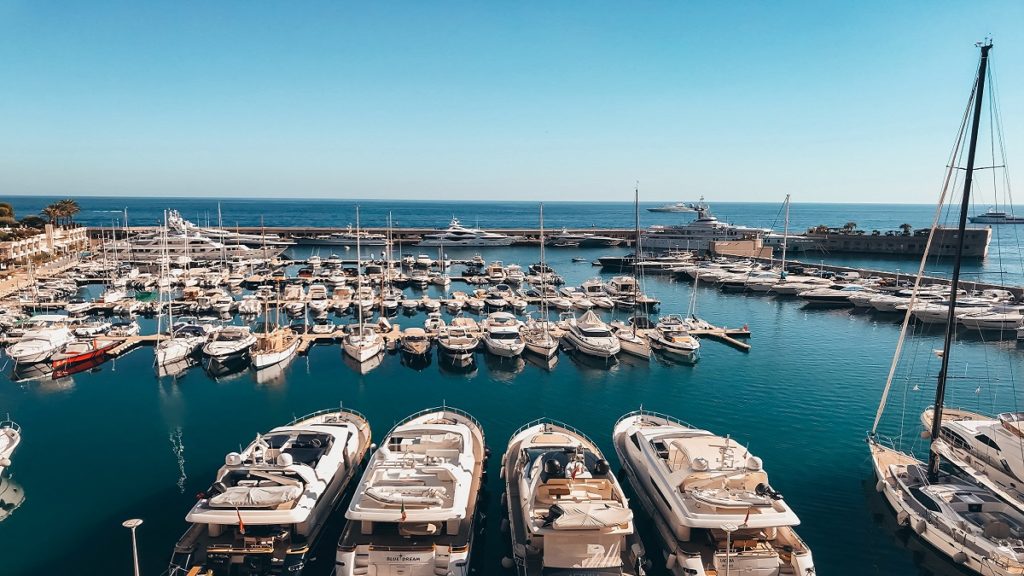
Departments are all organized in a hierarchy, with a department head reporting to the Captain. The clear chain of command makes for smooth operations, with all communications going up and down ranks. Junior staff will occasionally take instructions from other divisions as all crew is expected to help as needed. A captain or department head may organize staff differently, so reporting structures listed are guidelines only.
All salary ranges are monthly figures and are ranges based on yacht size and crew experience. Senior jobs on larger yachts have more responsibility than the same job title on yachts with smaller crews. Experienced crew are very desirable and can expect more pay for their positions.
Listed responsibilities are not exhaustive, and different yachts may allocate some jobs to different positions.
Read also: The yacht charter experience ladder
The Captain

The captain of the vessel is the overall decision maker for the yacht in all situations, including the safety of the vessel. The owner should leave the Captain responsible for operational decisions about hiring and staff and operating the ship. To become a captain requires years of experience and training, and a broad set of skills including yacht operations, personnel management, budgeting and finance. The captain works directly with the owner and owner’s representative, if the captain is not also acting as the representative.
On an organization chart, the Captain is usually placed in the deck division, but the Captain is always the senior-most crew on the yacht and all division heads report to the Captain.
Responsibilities include:
- Responsible for all navigation and running the yacht.
- Senior decision maker on all crew hiring.
- Manage repairs, refits, and yard work.
- Manage budgets and accounting. On larger yachts, this task ends more on the Purser, but the captain is always responsible.
- Ensure all paperwork, clearances, and legal requirements are completed.
- Primary contact with the owner or charter parties.
Reports to: The yacht owner
Salary Range: $6,000 to $22,000
The deckhands handle all the outside responsibilities of the ship, including cleaning and maintenance of the yacht and all the ship’s vessels and toys on board. Deck crew will have significant contact with passengers in this role, operating launches and delivering guests to and from shore and handling the toys.
All deck crew have watch responsibilities on passage, and daily responsibilities keeping the yacht pristine and clean. They will also do line handling and secure the yacht.
Deck department : Chief Mate/First Officer
The Chief Mate or First Officer is the second in command of the vessel, and left in charge when the Captain is not on board. The first mate has the requisite skills to stand in for the captain and run the yacht if needed and usually acts as the division head of the deck team.
The seamanship skills needed are similar to the Captain’s position.
- Primary safety officer for the yacht and all passengers and crew.
- Supervise and manage all operations on deck.
- Bridge watches on passage.
- Passage planning and navigation.
There may be additional mates on larger vessels, these 2nd, 3rd, etc. mates have similar responsibilities on rotation. But the first mate is senior and always second in command.
Reports to: Captain
Salary Range: $4,000 to $9,500 (First mate)
Second and more junior mates may earn $2,000 to $4,000
Deck department : Bosun
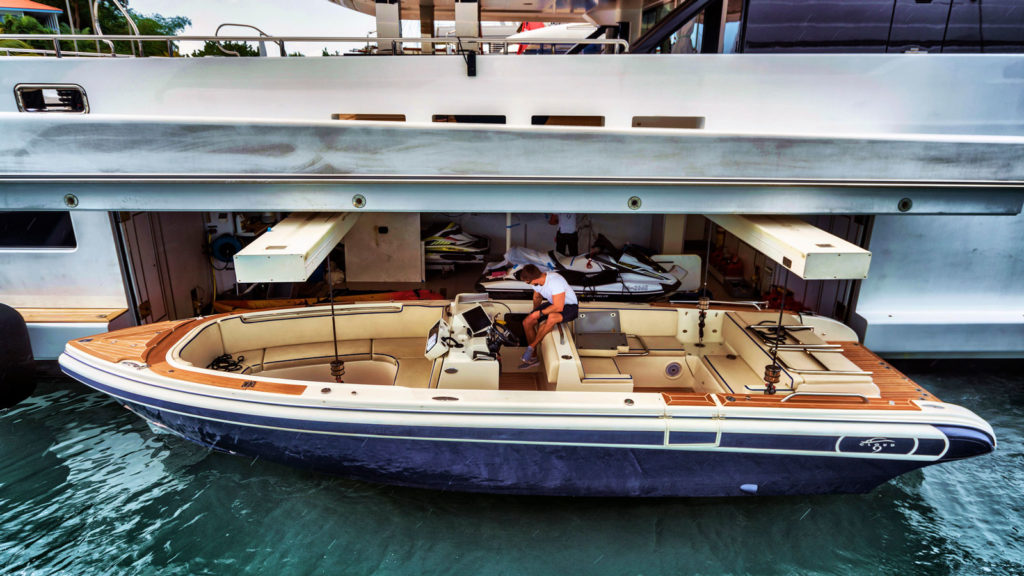
The Bosun is the senior deckhand and manages the junior hands on board. This will usually be the most experienced hand on board.
- Organizing all operations on deck.
- Coordinating the use, storing and launching of the ship’s boats, toys, and equipment.
- Managing the passerelle, watching passenger safety.
- Contact point for guest service on boats, toys, and trips to shore.
Reports to: First mate
Salary Range: $3,000 to $5,000
Deck department : Deckhands
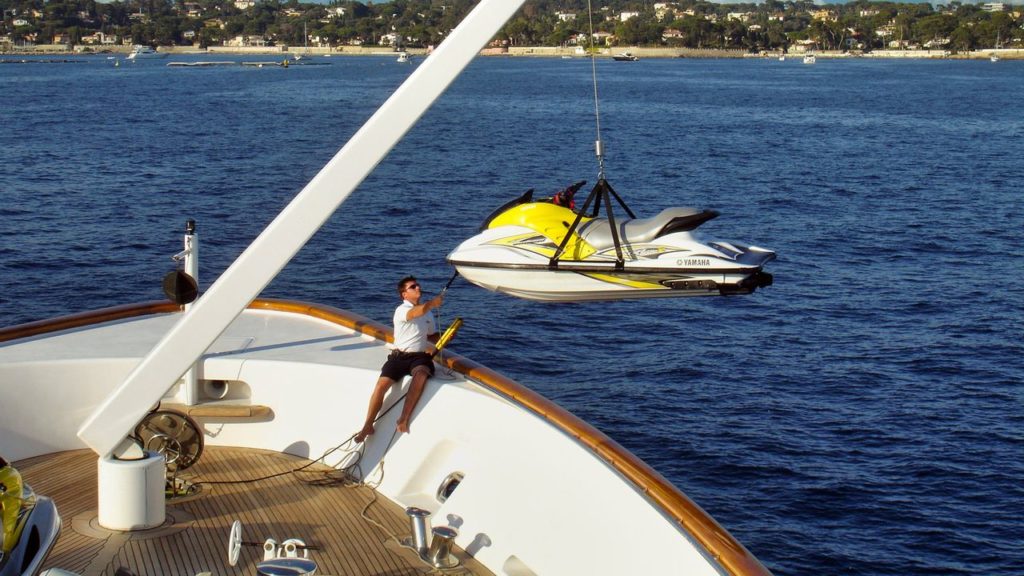
Deckhands are constantly busy with maintenance, cleaning, polishing, and assisting guests as needed. They will assist other departments as needed or given special duties.
- Daily cleaning of the yacht’s exterior.
- Painting, varnishing, polishing.
- Line handling.
- Launching and operating dinghies and tenders.
- Repairs and carpentry.
- Helping guests as needed – everything from handling baggage and gear to embarking and disembarking.
Reports to: Bosun
Salary range: $1,300 to $3,000
Though every position on a yacht is service-oriented, the interior or inside crew provides the primary customer service. They will interact the most with the passengers daily, and they’re directly responsible for the quality of their experience on board.
Interior department : the Purser

The purser is the chief financial officer of the yacht and handles all the financial operations on board. Accounting, purchasing, payroll and hiring, and all money matters end up with the Purser. This is a senior staff position, and may be the interior department head. Smaller yachts may eliminate the purser’s job and add it to the captain’s and other senior staff duties.
Responsibilities Include:
- Accounting and bookkeeping for all financial transactions.
- Human resources and payroll.
- Handling logistics for all departments related to purchasing.
- Managing contracts.
- Event coordination, including off yacht bookings and payments.
- Primary administration of the boat’s business paperwork.
- Inventory and supply management.
Salary Range: $4,000 to $8,000
Interior department : The Chief Steward/ess

The chief steward or stewardess has primary responsibility for all service roles inside. Food and drink service, cabin preparation, and anything to do with helping the passengers be more comfortable and enjoy their stay. The chief steward will be inside crew with several years of experience.
The chief steward manages the interior staff, setting and enforcing vessel service standards. The chief steward ensures the crew delivers a five-star hospitality experience.
Chief Steward Responsibilities:
- Scheduling and training junior crew for meal and drink service and cabin preparation.
- Primary contact with guests for meals and drinks.
- Sommelier and wine service.
- Coordinate with the galley for meals and presentation.
- Decorate the interior, from flower arrangement to table settings.
- Arrange onshore activities and outings.
Reports to: Captain or Purser, depending on the yacht
Salary Range: $4,000 to $8,500
Stewards/Stewardesses
The stewards and stewardesses are the primary guest service staff. They will work closely with guests and passengers, and have daily contact with them as they meet most of their needs while on board.
Steward Responsibilities:
- Food and drink service.
- Room preparation and turndown service.
- Cleaning, polishing, housekeeping, and inside maintenance.
- Cabin detailing.
- Laundry, pressing, and folding.
- Help with outings, trips, debarkations.
Reports to: Chief Steward
Salary Range: $1,500 to $4,500
Housekeeping

Larger yachts may have a dedicated housekeeping and laundry staff. This will be part of the inside crew, under either the purser or the head steward. There may be a senior housekeeper, if there are more than one housekeeping crew on board.
Responsibilities are the cleaning and laundry portions of the steward’s job, and a laundry steward may spend most of her time inside the ship’s laundry.
An experienced Head of Housekeeping may earn from $4,500 to $7,000, while a Laundry Steward typically earns from $2,500 to $3,500.
Read also: CAN OWNING A YACHT TO CHARTER (REALLY) BE PROFITABLE?
Food service requirements on any yacht are high. Whether it’s a privately owned vessel or a charter, the expectations are always for top tier food service, with a variety of meals planned for the requirements of every passenger. Chefs and cooks prepare all meals on board for passengers and crew, but sometimes other interior crew may help with prep work or cleanup.
Smaller yachts have smaller galley crews, but the largest vessels may have an executive chef and several sous chefs. All chef positions require formal culinary training and experience, but cook positions are often entry level. Promotion from cook to chef is unusual without additional training.
Galley department : the Head / Executive Chef

On larger yachts, an Executive Chef will run the entire galley with the help of sous chefs and cooks. With an Executive Chef, there’s an expectation that the food and menus will be on a level with Michelin star-rated restaurants.
The executive chef brings a thorough understanding of food preparation and presentation, and moves food preparation past creative up to artistic. Job responsibilities are similar to a chef, but the job demands and the required experience and education are much higher.
Salary range: $7,000 to $11,000
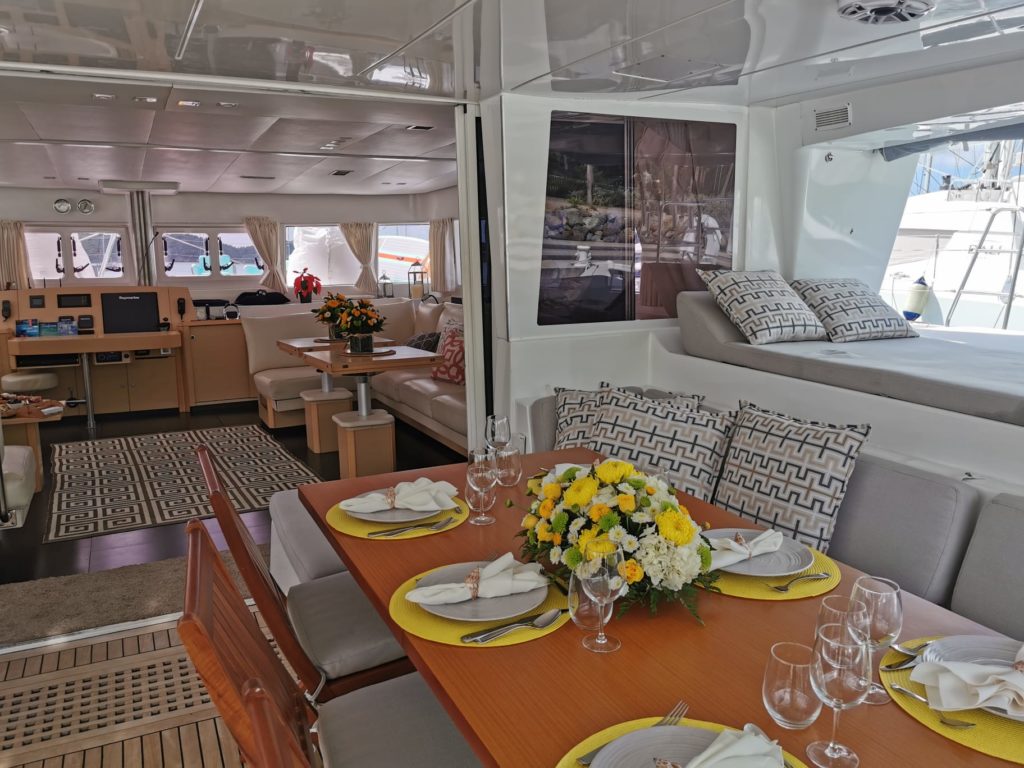
The chef has overall responsibility for all meals on the yacht, from provisioning in remote places to hygiene and good safety. If there’s only one chef, she’s the head of the galley crew. Finding the best provisions in far away locations and making the best of local food availability is a major part of the job.
- Planning a delicious and varied menu for passengers.
- Sourcing all food and arranging transport to the yacht.
- Maintaining and operating within the galley budget.
- Preparing passenger meals with professional presentation and style.
- Cleaning and maintaining galley and galley equipment.
- Deliver menus and meals on time, while running an organized and spotless galley.
Galley department : Sous Chef
The sous chefs assist the chef in all aspects of running the galley, and may have independent assignments to plan and guest and crew meals. While not primarily responsible for provisioning, the sous chef will help with food selection, menu preparation, and planning. A sous chef must have formal culinary training.
Reports to: Head chef
Salary Range: $3,500 – $6,000.

Galley department : The Cook
Cooks may be entry-level positions or experienced, but do not require formal gastronomy education. They will assist the chef and sous chefs, cooking meals and dishes for guests and crew, helping with provisioning, and keeping the galley neat.
- Assist with provisioning and buying high-quality food from local sources.
- Follow all food handling and safety guidelines.
- Assist the head chef as needed, taking direction and guidance.
- Prepare guest and crew meals as required.
- Staying on top of galley inventories and supplies.
Salary Range: $2,500 to $3,500
Engineering

The engineering department keeps the yacht and all its systems working. Whether it’s the engines, electronics, air conditioning, or the plumbing – it’s up to engineering to keep it running.
There is considerable overlap with commercial shipping in the engineering field, as many of the same skills apply. And there is a broader range of qualifications and grades based on the size and power of the vessel. Job ratings may be set by required experience based on tonnage of ship or power of engines, with corresponding levels of pay and responsibility.
Unlike commercial shipping, engineers may get involved in other aspects of running the yacht, like helping with docking and water sports with mechanical toys.
Engineering certifications, training, ratings, experience and licensing are critical to hiring competent engineers, and for engineering crew it’s an important facet of career advancement. This is important for Chief and 2nd Engineers, which are often broken out by MCA (U.K. Maritime and Coastguard Agency) rating or other international equivalent.
MCA ratings for engineers Commercial and Private Yachts over 24m are:
Y4: Less than 200 Gross Tons and less than 1,500 kW engine power Y3: Less than 500 GT and 3,000 kW Y2: Less than 3,000 GT and 3,000 kW Y1: Less than 3,000 GT and 9,000 kW
There is also an unlimited rating for merchant vessels larger than the Y1 category. For discussing salary and responsibilities, we will include all ratings in one position description, but pay scales with the size of the yacht and any required higher ratings.
Chief Engineer
The chief engineer manages all aspects of keeping the yacht and its systems running. The chief engineer manages all the engineering staff, and directs all maintenance, repairs, troubleshooting and upgrades. This is a management position, but requires extensive hands-on technical experience and knowledge. Chief engineers on large yachts hold an MCA Y1 or Y2, smaller boats will have a lower rated chief and a smaller staff. Check Jooble.org to find abroad marine engineer vacancies.
- Provisioning, shopping, and stocking.
- Preparing passenger and crew meals.
- Following instructions and cooking under the direction of others.
- Galley cleaning.
- Follow food safety and storage procedures.
- Food pre-preparation.
Salary Range: $6,000 to $15,000
2nd Engineer
The second engineer is also a highly skilled position requiring a rating or license and several years of experience. This senior level engineer also needs knowledge of how to troubleshoot and maintain all yacht systems.
- Maintain and manage all engineering operations.
- Hire, train and supervise all engineers.
- Project manage all upgrades and retrofits, including managing budgets, contracts, and suppliers.
- Coordinate maintenance schedule for the entire yacht around the usage and seasonal schedules.
- Maintain costs and accounting for engineering operations.
- Design and handle all safety operations.
- Set and maintain standards for operations and cleanliness in the engine room.
Reports to: Chief engineer
Salary Range: $5,500 – $10,000
OOW (Officer of the Watch) Engineer
The OOW is a junior engineering position, but still licensed. There are two categories of OOW – MEOL (Marine Engine Operator License) and the more junior AEC (Assistant Engine Course). The overall responsibilities are similar, working to support the senior engineers and handle independent assignments. The AEC rating is entry level for licensed crew, but has training and certification.
- Support the chief in all projects.
- Maintain a clean, safe engine room.
- Perform all maintenance, troubleshooting and repair tasks as needed.
- Support motorized water sports.
- Occasionally assist with other vessel operations, like line handling.
Reports to: Chief Engineer
Salary Range, MEOL: $4,500 to $6,000 Salary Range, AEC: $2,500 to $3,500
Electronics/Technology Officer (ETO)
The ETO takes responsibility for all audio-visual and information technology on board. Ensuring passengers have access to the internet, movies, television, and music is a primary responsibility. This position carries a fair amount of passenger interaction, and an ETO needs good troubleshooting skills to go with customer service skills.
- Ensure all audio/visual and entertainment systems are always available for passengers.
- Assist passengers with personal technology and ship systems as needed.
- Conduct regular maintenance and upgrades of the network, information, and A/V systems around passenger schedules.
- Assist other engineers as needed, especially with electronic systems.
- Contribute as needed with other departments for boat and passenger operations.
Salary Range: $4,000 to $9,000
Junior Engineer
This is a lower or entry level position for someone with engineering skills but without formal licensing or certification. The junior engineer will help with safety and cleanliness, and assist in any engineering tasks as needed. The ability to solve problems and fix things opens this spot for anyone capable and willing to do the job.
- Help with cleaning, maintenance, and safety functions.
- Help anywhere needed on the yacht.
- Assist senior engineers as needed, taking direction and following instructions exactly.
- Constantly develop skills.
Read also: IS BUYING A BOAT A BAD IDEA?
Whether you are a yacht owner or considering entering this dynamic industry with an established and reliable crew, it is essential to have an understanding of the yacht’s hierarchical structure, mission priorities, and salary expectations. By doing your research on the complexity of yachting before hiring your team, you can confidently select the right group of experienced and qualified professionals for your needs. Staying up-to-date on top industry trends and knowing the capabilities of each type of yacht crew position will enable you to make sound decisions that support a safe and cost-effective journey. With quality personnel at your helm, you can cruise unhindered in luxury and explore new destinations with peace of mind.
Yachts in Below Deck: All Boats of the TV Show (& their Prices!)
What is the best country to register your yacht offshore, you might also like.

What differentiates a yacht from a superyacht or a mega yacht?
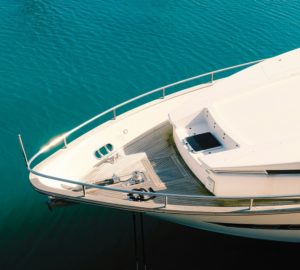
Chartering Requirements and Regulations: A Guide for Boat Owners

What are the Fastest Cruising Catamaran on the Market?

Yacht Crew Salaries: The Current State
Posted October 12, 2023 by Ashleigh King
The topic of salaries in the yachting industry has gained attention this year, with a growing sense of awareness and discussion. Louisa had the opportunity to speak with several dedicated crew members who have shared their thoughts and concerns about this matter. With the ever-changing economic landscape, it’s crucial to assess whether salaries for yacht crew have adapted to these shifts in a positive direction.
A comprehensive analysis of Dockwalk’s salary surveys over the past several years reveals a rather consistent pattern spanning a 15-year period. Specifically, when comparing salaries in euros for a 50-meter yacht between 2008 and 2023, certain trends emerge. In the case of Captains, the industry average in 2008 ranged from 7,000 to 10,000 euros per month, while this year, it has extended from 7,000 to 15,000 euros per month. Similarly, Chief Engineers in 2008 were earning an average of 5,000 to 7,000 euros per month, whereas in 2023, their earnings range from 5,000 to 10,000 euros per month. It is noteworthy that while the lower-end salaries have remained relatively consistent, the upper-end figures have witnessed a significant increase, aligning more closely with industry expectations.
While the top-end salaries can be attributed to experience and longevity, it remains pertinent to question why the baseline salaries have remained at their current level. This inquiry may stem from the various factors related to job availability and individual crew preferences. It’s possible that, after a period of uncertainty, many crew members are now placing a higher value on the stability of full-time positions over seeking higher pay.
Engaging with numerous crew members who express diverse expectations and requirements underscores the challenge of establishing industry standards, especially considering the growing prevalence of rotational contracts. A notable example illustrates this complexity: I recently met a Captain who was perplexed by the stark disparity in his salary compared to that of a colleague. However, one crucial aspect he overlooked was that his counterpart had been with the same owner for four additional years, underscoring the significance of longevity in this profession.
Furthermore, entry-level crew members are facing their own set of challenges. Green crew are currently being offered a monthly compensation of 2,000 euros, which is nearly the same from 15 years ago when it ranged from 2,000 to 2,500 euros.
While the average monthly compensation for green crew hasn’t seen substantial growth over the past 15 years, it’s essential to acknowledge the rising costs associated with crew housing, food, and travel. In this light, exploring creative solutions to improve the financial well-being of entry-level crew members is a valuable consideration.
While the topic of salary stagnation in the yachting industry has raised concerns, there is also a silver lining. Salaries for experienced crew members have been on an upward trajectory, and the industry is evolving to accommodate different needs and preferences. By focusing on the positive aspects of these changes, we can look forward to a brighter future for all members of the yacht crew community.
Download our Crew Salary Guideline PDFs in Dollars and Euros for more helpful information.
With our presence established in the key yachting hubs worldwide, we stand ready to address all your crew-related requirements. Don’t hesitate to reach out and schedule a consultation with one of our dedicated N&J Crew team members today!

Proud to be part of the MarineMax family
© 2024 Northrop & Johnson
Impartial training and careers advice
Call us: +441983 280 641
+441983 280 641
Superyacht Crew Salary Guide – 2023
- Superyacht Crew Salary Guide – 202...
Working as a crew member on a Superyacht has some incredible perks…
… from being on the ocean and seeing new countries to brushing shoulders with the rich and famous and, of course, earning an amazing salary.
As we begin 2024, we thought it a good opportunity to look back at 2023 to see how the industry faired and whether there have been any changes to salary, tips, and working conditions.
The good news is that things have got better! Since the pandemic, the Superyacht industry has seen significant growth the industry has grown significantly over the last couple of years .
As the number of Superyachts being built increases, so does the demand for crew; there has never been a better time to enter the industry.
Typically, the entry-level salary for a Deckhand and Steward/ess ranges between €2,000 and €3,500, rising to €4,000+ for more senior roles. A Captain can make €10,000+ per month, depending on the size of the Superyacht!
Moreover, as you’ll be living onboard the yacht, there are no living expenses to worry about. Your meals are prepared by the Chef onboard, too, and you rarely need to buy groceries or toiletries.
We can’t talk about Superyacht Salary without mentioning tips. The majority of Superyacht owners charter their yachts as the ultimate holiday experience! A Superyacht does not come cheap, with some chartering for One Million per week! Guests normally leave a tip and around 10% of the charter fee, which is shared equally among the crew. It is not unheard of for a Deckhand or Steward/ess to receive a €5,000 tip after a week’s trip!
Another huge benefit contributing to the amazing Superyacht salary is the potential for tax-free earnings (typically paid in Euros)!
Read on for our complete guide to the Superyacht crew salary for 2023…
How much do you make working on a Superyacht?
In short, your salary will depend on the role you work in on the Superyacht, in conjunction with its size; however, the average salary is €2,500 per month (most boats pay in Euros rather than pounds).
Several other factors will determine Superyacht crew salary, too, including previous experience, qualifications, and extra skills (such as Dinghy Instructor, Carpenter, and Divemaster, to name a few).
Whether the yacht is chartered or privately owned will all contribute to your monthly pay packet; your basic salary will be the same whether you work on a charter yacht or a private boat, though on a charter, you will generally receive tips; this usually around 10% of your monthly salary, or it can range between €1,500 to €5,000+ .
We’ve shared current Superyacht salary approximations for 2023 in the table below:
How much do you make working on a yacht?
Here’s a breakdown of superyacht crew salaries in more detail by role:, superyacht captain salary – €4,000 to €16,000+.
A Superyacht Captain is responsible for all activity onboard, crew safety and well-being, and the experience offered to guests.
The Captain is the owner’s main point of contact on the yachts; whether things are going right or wrong, it can be a highly pressured and stressful job.
The salary reflects the responsibility in this high-pressure environment, and the range in salary normally depends on experience and the boat’s length.
Generally, larger boats will carry more guests and staff; therefore, the Captain will have higher responsibilities, a bigger budget, and more challenges to cope with.
First Officer salary – €3,200 to €8,000+
The First Officer, also known as Chief Officer or Chief Mate, is always second in command to the Captain.
They will assist the Captain in a wide range of duties and tends to be responsible for the safety of the Superyacht and everyone on board. Furthermore, the role of the First Officer also includes bridge watches and navigation.
Due to needing a firm understanding of working on deck, the First Officer normally starts their career as a Deckhand and progresses from there.
If you are an experienced First Officer and have moved onto larger yachts, then your next step will be to become a Captain.
Superyacht Bosun salary – €3,200 to €5,000+
Otherwise known as the Senior Deckhand, the Bosun is the ‘line manager’ of all Deckhands on the boat. The responsibilities of the Bosun are to manage and maintain the exterior of the yacht to the highest order.
This role also includes spending time with the guests, making sure they are having fun and are safe on all the toys the Superyacht has, such as jet skis and dinghy sailing boats.
Chief Stewardess salary – €2,800 to €7,000+
The Chief Stewardess is responsible for the interior of the Superyacht. Attention to detail, elegance,
and cleanliness is paramount for this role.
Moreover, you will be required to perform duties discreetly and anticipate the requests and demands of guests, as well as manage your team of Stewardesses. A managerial background in hospitality will therefore help for this role.
Generally, the Chief Stewardess will have gained previous experience in an entry-level Stewardess role and fully understands the functions of a working Superyacht.
Superyacht Stewardess salary – €2,000 to €3,500+
This is an entry-level position working on board a Superyacht.
Open to Male and Female
Being a Superyacht Stewardess is a wide-reaching role covering three main areas: Service, Housekeeping, and laundry. Your actual day-to-day activities can vary depending on the type of yacht (private or charter), owner, and Itinerary. You will be the host, cleaner, florist, and housekeeper, and collectively responsible for looking after the guests 24/7.
If you are looking at not going to uni , and want a career with real progression and a very good salary, becoming a Superyacht Stewardess could be for you! If you would like to start a career as a Stewardess, then consider joining our Superyacht Steward/ess course.
Superyacht Deckhand salary – €2,000 to €3,500+
This is another entry-level role to work on a Superyacht.
Open to male and female
A very hands-on role, the Deckhand is responsible for the exterior of the yacht, and tasks will typically involve cleaning, painting, sanding, varnishing, and all general maintenance of the boat.
As with all Superyacht roles, working as a Deckhand requires some skills and qualifications before you start looking for work. The good news is that you don’t have to go to Uni to get whats required. You will be able to get qualified in a few weeks.
How to become a Superyacht Steward/ess or Deckhand.
If you want a career in the Superyacht Industry, we are here to help. Contact us by phone, email, or live chat. Alternatively, book a meeting with one of our career advisors.
Looking for more information on working in the Superyacht industry?
Download our free guide and learn all there is to know about working on a superyacht as a deckhand or steward/ess., related articles.
- Seafarers Tax
5 ways to ensure your SED claim is rock solid
The Seafarers’ Earnings Deduction, often referred to as the SED, is a tax legislation that enables seafarers to claim back their UK income tax. It a...
Do I need to pay off my Student loan if I work on a Superyacht?
Good question! First, let me say that the information below is aimed at people who have studied in the UK and took out a Student Loan to cover course ...
Have I got the right experience to work in yachting?
If you’re thinking about working on board a Superyacht, we share the skills and experience you need and how to get into the yachting industry in thi...

Yacht Crew Salaries: Complete Guide to What Yacht Crew Earn
It’s no secret that the impressive yacht crew salaries attract most people into the exclusive yachting world.
Junior deckhands or stewardesses can earn starting salaries of $3000 per month. With a few years of experience and some courses to back you up, this amount moves up towards $4000-$4500 per month!
In order to compile this superyacht crew salary guideline, I have taken 10 of the top yachting platforms and used all of their data, combined with my personal experience, to reach an average salary expectation for each position.
Table of Contents
How Much do you Make Working on a Yacht?

Yacht Captain Salary
- 20m-30m: $4000-$7500
- 30m-40m: $5500-$9500
- 40m-50m: $8000-$15000
- 50m-70m: $13000-$19000
- 70m+: $16500+
Requirements of a Yacht Captain
- Years of experience needed: 3-5 years of experience as Chief Officer/Mate and more than 5 years of experience as a Captain for larger yachts
- Minimum level of Qualification: 200ton licence which allows you to drive vessels below 200tons
The Captain has the highest level of responsibility onboard the yacht and hence they earn the most out of all the yacht crew salaries.
Captains are accountable for the overall safety of the yacht, crew members and guests.
They also handle daily operations of the yacht, guests, and owner liaison. They deal with management companies, port control, budgets, human resources, and many more tasks and logistics that make the job demanding and stressful.
On top of this, Captains are required to hold high levels of certifications depending on the size of the yacht they are driving.
Yacht Captain salaries can sky rocket with higher levels of qualifications.
If you are looking to become a Yacht Captain one day I recommend looking into the courses required so you can get started with licenses and sea time. It takes time to get there, but when you do it will be worth it.

Chief Officer Yacht Salary
- 30m-40m: $4000-$6000
- 40m-50m: $4500-$7500
- 50m-70m: $5500-$9000
- 70m+: $8000+
Requirements of a Chief Officer
- Years of experience needed: 3-5 Years
- Minimum level of qualification: Officer of the Watch
The Chief Officer is second in command to the Captain and is responsible for carrying out the Captain’s standing orders.
On smaller yachts, the Chief Officer is referred to as the Mate.
The Chief Officer is responsible for carrying out the safety duties onboard and assisting in the bridge with paperwork and navigational planning.
The Chief Officer is also responsible for leading and managing their deck team, ensuring crew are following their duties as well as managing the water sports and guest activities.
The salary of a Chief Officer depends heavily on the license held.

Bosun Yacht Salary
- Years of experience needed: 2-3 years
- Minimum level of qualification: Yacht Master Offshore
- A yacht Bosun salary can vary between $4000 and $6000.
Responsibilities of a Bosun
The Bosun is essentially the Lead Deckhand onboard. A lead deckhand salary on a larger vessel will be similar to that of a bosun salary on a smaller vessel.
This is an opportunity to step up from being a deckhand and gain some experience in a leadership role. This position is in place for larger yachts so that when the Officer is busy with bridge duties, someone is in charge on deck.

Yacht Deckhand Salary
Years of experience needed: 0
- Minimum level of qualification: None needed, however Power Boat Level 2 and Yacht Master offshore will put you at a great advantage
- Entry-level yacht crew salaries start at $3000 and can go as high as $4000/$4500.
Responsibilities of a Deckhand
A Deckhand is an entry-level role on a yacht.
You need to spend a few years (or less) as a Deckhand in order to learn and gain experience so that you can step up in the ranks and obtain your licenses.
This role will be very hands-on in maintaining the exterior of the yacht. Duties will include cleaning, polishing, varnishing, sanding, caulking, and any other maintenance work required.
Chief Steward / Chief Stewardess Salary
- 30m-40m :$4500-$5500
- 40m-50m :$5000-$7000
- 50m-70m- $5500-$8000
- 70m+: $7500+
Responsibilities of a Chief Stewardess/Steward
- Years of experience needed: 3-5 years
- Minimum level of qualification: Depending on the size of the vessel you may need courses such as Food Hygiene and Safety, Silver Service, WSET, or a Purser course
The Chief Stewardess or Steward is responsible for all the interior operations of the yacht .
They are responsible for managing the interior team, and ensuring the interior of the yacht is maintained to the highest standards. Besides cleaning and laundry schedules , this also includes provisioning for crew and guests, budgeting, accounting, and training of junior crew.

Steward or Stewardess Yacht Salary
- Minimum level of qualification: Depending on the size of the vessel you may need courses such as Food Hygiene and Safety and Silver Service
- Salaries start at $3000 and go up to $6000
Responsibilities of a Steward or Stewardess
A Stewardess/Steward is an entry-level position working within the interior of the yacht.
There are rankings within the interior (2nd, 3rd, 4th Steward/Stewardesses). As you spend more time in the industry, you will be promoted to higher ranks, and with that will come a better salary and more responsibility.
This role covers a range of tasks, including but not limited to housekeeping, laundry, bartending, table scaping, floral arrangements, serving, and hosting guests.

Engineer Yacht Salary
- 20m-30m: $4000-$5000
- 30m-40m: $4500-$6500
- 40m-50m: $6000-$8000
- 50m-70m: $7500-$11000
- 70m+: $9000+
Requirements of an Engineer
- Years of experience needed: 2-4 years in an engineering role onboard as Deck/Engineer or relevant land-based experience
- Minimum level of qualification: AEC
The Engineer onboard is responsible for all mechanical functioning and maintenance of the vessel. This is a very technical role that can pay well as you gain experience and obtain your licensing.
Yacht Chef Salary
- 20m-30m: $4000 – $5000
- 40m-50m: $5500 – $75000
- 50m-70m: $6500-$9500
Requirements of a Yacht Chef
- Years of experience needed: 3-5 years depending on previous experience
- Minimum level of qualification: Food Hygiene and Safety Level 2
The Chef is responsible for feeding the crew 2 to 3 healthy and sustainable meals a day. They are of course required to prepare meals for guests when onboard to the highest of standards.
In their day-to-day tasks, they will be responsible for their own provisioning of the galley, maintaining stocks, cleanliness, and hygiene of the galley.
The salary of the Yacht Chef varies depending on qualifications and experience.

Yacht Crew Salaries for Private vs Charter Yachts
There are two types of super yachts that require crew: Private and Charter yachts. The salaries for yacht crew differ slightly between the two.
Private Yacht
A private boat is owned by a single person or family who uses the yacht for their own purposes. They don’t charter it out and you can expect to have the same guests onboard for the duration of your contract.
The benefit of these programs is that you get to know your guests well so you may find it easier to manage their wants and needs.
You may also benefit from traveling to off-the-beaten-track locations as I have!
For yacht crew working on these private boats, you will usually not receive charter tips.
Charter Yacht
A charter boat is one that gets chartered out by guests. This operates as a business and also means you will have different guests for every trip.
If you work on a charter boat you can expect to receive charter tips at the end of each charter. These are usually 10%-20% of the charter fee!
Considering these tips can be anywhere from $2000-$5000 per week depending on the size of the yacht, charter boats offer great earning potential and can skyrocket your salary as a yachtie.

Hi, my name is Lisa, a Chief Stewardess in the yachting industry with 10 years of experience, as well as 8 years of hospitality experience prior to that. Being in the yachting industry has been a whirlwind of adventure, growth, challenges and some of the best experiences of my life, and I am excited to share my knowledge and experiences with all of you.
How to Write the Perfect Yacht CV [With Template]
A day in the life of a yacht stewardess.

Yacht Crew Salaries By Position
Ever wondered what staff members aboard a luxury yacht charter make? Here’s a breakdown by position. Some may surprise you.
If you have ever binge-watched Below Deck, or daydreamed about working on a luxury yacht, you may have thought to yourself, “I wonder what they make?”. Many people across the world have jumped at the opportunity to rub elbows with the world’s elite while working aboard the most luxurious ships in the world.
If you have wondered what the salaries are for workers on a yacht, and want to take the next step toward a great mix of freedom and pay, joining a luxury yacht crew might be for you.
Crew jobs on yachts can be some of the most rewarding careers available, but they are also challenging. It is important to know what to expect when applying for a crew job. Here is a breakdown of what you can expect to find when applying for a yacht crew job.
Yacht Staff Departments
To understand the yacht crew job descriptions better, you have to understand the different departments in a yacht. These departments include:
- Deck – passage delivery, safety, outdoor guest activities, and exterior maintenance.
- Interior – guest wellbeing, housekeeping, accounting, activities.
- Engineering – smooth running of the yacht and safety.
- Galley – stock control, hygiene, food preparation, galley maintenance.
On any yacht, the captain is at the top of the hierarchy. They are responsible for reporting to the vessel’s owner via a representative or directly. Below are the job descriptions for yacht crew members in these departments.
Salaries will vary depending on the size, type, location, and use of the yacht. The crew’s experience and qualifications will also play a role in determining their salary.
Deck Department Roles
The captain’s job description includes: keeping the vessel safe and secure, ensuring that all crew members are doing their job, and reporting any safety concerns. Typically, this person will also be in charge of hiring other deck officers for specific duties. Depending on various factors, the captain could be paid $4,200 to $15,800 per month.
Although this an extremely high pay rate, it requires decades of experience typically. Being in charge of the safety of passengers, crew members and potentially a $50 million yacht is serious business!
Chief Officer/First Mate
Chief officers’ responsibilities include supervising the crew’s daily activities, maintaining duties and duties lists, and overseeing crew pay. This is also the person who will be in charge of hiring other crew members and managing the activities or watersports the guests would like to participate in. Typically, this person will make around $3,100 to $14,200 per month.
Second Mate
The second mate’s job description includes: being in charge of navigating the yacht and overseeing any repairs that may be needed. Typically, this person will make around $3,100 to $8,400 per month.
The third mate’s responsibilities include: handling deck chores and maintenance for the yacht. The salary is $2,600 to $6,300 monthly.
A bosun is in charge of safety and security, supervising diving operations and monitoring all deck equipment. They will also maintain the diving records whenever necessary. This person will make around $2,600 to $6,300 monthly.
Interior Department
A purser is responsible for hiring, training, and caring for all crew members. They are sent out to find candidates and supervise their performance in port and during sea trips. They are responsible for every operation in this department. Typical salaries go from $5,200 to $9,400 monthly.
Chief Steward
The chief steward is responsible for hiring, training, and supervising all crew members in the interior department. They will set up work schedules, determine pay scales and enforce penalties if they are not followed. Typical salaries go from $4,800 to $8,800 monthly.
The steward is in charge of the kitchen, taking orders and keeping track of all supplies. They unpack and pack the guest’s luggage and remain on standby at all times in case anything happens. Salaries go from $3,100 to $6,800 monthly.
Engineering Positions
Chief engineer.
He or she is in charge of the engine room and is responsible for ensuring it is operating smoothly. The chief engineer is responsible for providing services to all the other positions on board if needed. They will make around $6,300 to $15,600 monthly.
Second Engineer
As the second in command to the chief engineer, this person will be in charge of all engine room duties and services that need to be done. Salaries are typically around $3,200 to $10,500 per month.
ETO Officer
An ETO officer will oversee all electrical and electronic equipment, including everything from the GPS to the yacht’s peripheral devices, lighting, and communications equipment.
They will be in charge of setting up the systems, testing them during repairs, checking their functionality, and identifying any problems. Salaries are around $4,300 to $8,500 monthly.
Galley Positions
The head chef is in charge of all the food preparation and storage. All food preparation is under the direction of this chef. They are trained professionals who ensure that strict hygiene standards and food safety are maintained. Salaries go from $6,300 to $10,500 monthly.
The sous chef is in charge of food preparation and operations and preparing all menus at the direction of the head chef. They prepare, cook, and serve all food items that the guests require while on board. Salaries go from $3,700 to $8,400 monthly.
Galley Staff
There is a galley staff who works in the galley. Galley staff will be responsible for washing dishes, cooking, cleaning, serving food, and preparing daily menus. Salaries go from $2,500 to $4,300 monthly.
The Bottom Line
This article covers the yacht crew job descriptions for various jobs on the yacht and their salaries. As you plan to secure a job in the yacht crew industry, ensure you know everything you need to about the job. What will be the working hours? Will there be leaves to travel home? You must be prepared before applying for any of these jobs on a yacht charter .
One thing to note is that some ormost of these positions aren’t available on all yacht charters. This will depend on a number of factors including the numbere of guests, size of the yacht, budget of the guests and location of the yacht.
Being a member of a yacht crew is both flexible and very strict at the same time. Your level of service and professionalism are critical to ensuring the esteemed guests have an experience they expect for shelling out tens of thousands of dollars. So, expect very strict rules while on board.
To learn even more about renting a yacht in San Diego, please visit our articles page!
Superyacht Crew Salaries: First Report Released
- Inspiration
Related News
Popular news this week, popular news this month, latest news.
- Yacht Charter & Superyacht News >
Written by Maria Korotaeva
Many life-long careers in the yachting industry have begun as a seasonal job or gap year with a desire to visit exotic destinations. The continual change and challenges that come with each new charter group make the positive feedback even more satisfying and those with lifelong wanderlust have a rare opportunity to see some of the world’s most incredible cities and scenery .
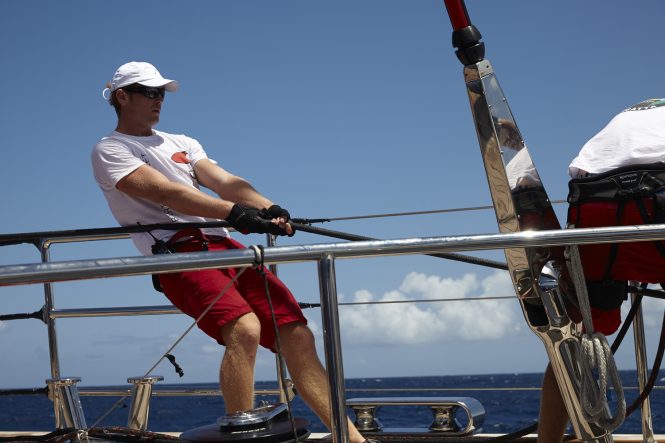
Seahwak’s Crew
Working on a luxury yacht isn’t without its drawbacks, however: Weeks at a time spent away from home, long working hours in the peak seasons and ensuring that everything runs smoothly when you’re far from the port can all take their toll. When performing tasks that can be as equally trying as they are rewarding, crew members want to assure that their pay reflects the professionalism and high degree of detail that they put into each day.
Following the launch of free salary-sharing platform www.yachtingsalaries.com in March 2016, YPI CREW has revealed its first report into the salaries paid to the crew on luxury yachts of various sizes.
Covering the period between 2016/2017, the results not only provide transparency to crew members but help employers to attract and retain individuals with exceptional skills. The occupations covered range from captains to deckhands and compare pay for permanent, private, rotation and charter crew: Find out how the charter industry measures up to the other sectors.
446 captains submitted information to www.yachtingsalaries.com, and the data revealed that 13% worked on sailing yachts and the other 83% on motor yachts. Captains on larger yachts earned more per month than captains of smaller vessels to create an upward trend, although M/Y captains of 35m-51m superyachts fared particularly well, with a jump in salary from €9,000 per month for 41m-50m yachts up to €13,000 p/m for larger luxury yachts. Private and permanent captains tended to earn the most for their size category, with permanent captains coming out slightly ahead.
Sailing yacht captains tended to earn the same as on motor yachts for the 0-35m and 35-40m vessels, earned more than motor yacht captains in the 41-50m category by €2,000 per month, and earned less than motor yacht captains by €2,000 in the 51-65m category.
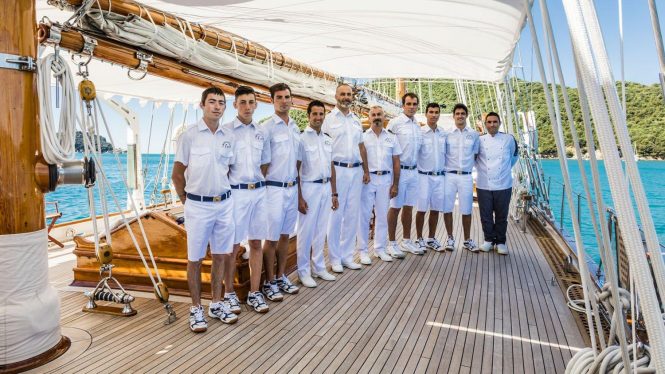
Crew aboard Crose Del Sud
Technical Crew
239 of the 434 technical crew surveyed were chief engineers, and on charter yachts, they earned an excellent salary compared to private, permanent and rotational counterparts on the same-sized yacht: In the 0-35m size category, they earned €6,000 per month compared to €5,500. Salary levelled off in the 80-100m category, with chief engineers on charters earning slightly less than others with a salary of €9,500.
Second engineers were the most stable across the sectors and received a steady pay of between €48,000, rising to €70,000 on the largest yachts. Second engineers on charter yachts were paid considerably more per month than permanent and private second engineers within the 51-65m and 66-80m categories, earning between €5,000-€10,000 more in the former category and €2,000-€5,000 per month more in the latter.
Third engineers earned between €2,500 and €5,000 per month, with the pay scale raising incrementally based on yacht size.
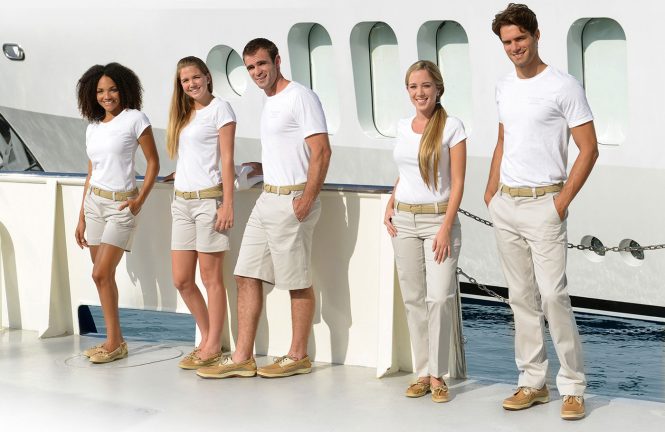
Luxury superyacht crew

Deck officers
69% of the 224 deck officers who took part in the survey were permanent and 31% rotational. Second and third officers had a greater chance of occupying a rotational position (50% and 70%), making deck officers the most likely crew members to have rotational work. Deck officers on charter yachts tended to earn less than counterparts on similarly-sized vessels, and private and permanent positions provide the most stable throughout.
Salaries for chief officers on charter yachts ranged from under €4,000 per month on 0-35m vessels to over €8,000 on 81-100m vessels and dropping slightly in the category of 101+m
Data for 2nd and 3rd officers was more sporadic, and charter position salaries ranged from €3,800 for both positions on yachts 51-65m and upwards.
Although 127 chefs participated in the survey, results were varied both for yacht sizes and sectors, producing the unusual graph where the head chefs on a 0-35m and 66-80m yacht were earning approximately the same (€4,000 per month) while on other sized charter yachts the head chefs were earning between €5,000 and €8,000. Of the head chefs who submitted data. 85% were permanent and 15% on rotation.

Dining aboard superyacht SuRi
Vessel size seemed to play a part in the salary of sous chefs, with each type of employees earning more on larger yachts. 71% were permanent, and 29% were temporary.
Pursers, Stewards and Stewardesses
For the 2016/2017 report, only 27 pursers, 68 chief stewards/stewardesses and 27-second stewards/stewardesses provided information, and there are therefore too few results to make solid conclusions about industry salaries in this area. Of the pursers, salary varies from €5,000 per month to €7,000 and remuneration did not have any correlation with the size of the yacht and salary was stable regardless of the type of employment, although results were the most unstable in the 66-80m category.

Excellent service onboard
Chief stewards and stewardesses received greater salaries for working on larger yachts, with rotation, permanent and private employment having the most stable salaries and charter crew the most variable: salary on a 51-65m superyacht was €6,500 per month, whereas under €6,000 was paid to stewards and stewardesses aboard 66-80m vessels and smaller yachts.
The results of the second stewards and stewardesses had the most variability, with charter and rotation crew earning under €3,000 for 66-80m vessels while private and permanent crew earned €5,000.
Deckhands
Deckhand salaries tended not to vary depending on the size of the vessel, and 93% were permanent and 7% on rotation aboard motor yachts, while sailing yachts had 100%, permanent crew. From the 87 deckhands that contributed to the study, data revealed that salaries tended to range between €2,100 – €3,000 per month, regardless of whether the yacht was a charter, private or permanent. Deckhands on rotation earned €3,000-€9,000 less depending on the size of the yacht.
The website www.yachtingsalaries.com currently has 2,857 searchable salaries and includes other professions such as bosun and helicopter pilot, as well as the full comprehensive report. Results are searchable at any time, and the next report is due in November 2018.
Please contact CharterWorld - the luxury yacht charter specialist - for more on superyacht news item "Superyacht Crew Salaries: First Report Released ".
- Charity & Fund Raising
- CharterWorld News
- Classic Yachts
- Coronavirus
- Cruise Ship
- Ecological Yachts
- Expedition Yachts
- Expert Broker Advice
- Feature Superyachts
- Interior Design
- Legal & VAT Yacht Issues
- Luxury Catamarans
- Luxury Gulet
- Luxury Phinisi
- Luxury Trimarans
- Luxury Yacht Design
- Luxury Yachts
- Marinas & Harbours
- Marine Ecology
- Marine Electronics
- Marine Equipment
- Mega Yachts
- Modern Yachts
- Motor Yachts
- New Launch Yachts
- New To Charter
- Open Style Sports Yachts
- Private Jets
- Sailing Yachts
- Social Media
- Sports Yachts
- Superyacht Crew
- Superyacht Photographers
- Superyacht Products & Supplies
- Superyacht Refits
- Superyacht Reviews
- Superyachts
- Uncategorized
- Yacht Builders
- Yacht Charter
- Yacht Charter Destinations
- Yacht Charter Picks
- Yacht Charter Specials
- Yacht Delivered to Owner
- Yacht Designers
- Yacht Events & Boat Shows
- Yacht Fashion
- Yacht Industry News
- Yacht Photos
- Yacht Racing
- Yacht Racing & Regattas
- Yacht Safety Equipment
- Yacht Support Vessels
- Yacht Tenders
- Yacht Videos
- Yachting Associations
- Yachting Awards
- Yachting Business
- Yachts For Charter
- Yachts For Sale
Quick Enquiry
Superyacht news:.
Email Your Yachting News to: news @ charterworld.com

Viking Recruitment expands and moves office
The 2010 Genoa Charter Yacht Show Starts Tomorrow and Features Superyacht ICON 62, TRIDENT, BISTANGO and CLOUD NINE
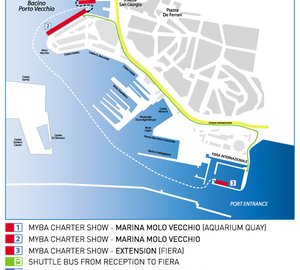
2011 MYBA Genoa Yacht Charter Show expands with extra dockage

Inaugural Superyacht Captains Forum in Auckland a success – Superyacht Captains enjoy Pacific tour
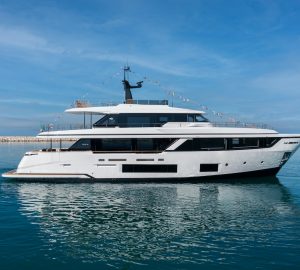
Ferretti Custom Line Navetta 30 series motor yacht GINDUNGO hits water in Italy

50m luxury motor yacht BEL1 launched in Pisa by Rossinavi

Luxury yacht UNIQUE S is brand new to the charter market in the Western Mediterranean
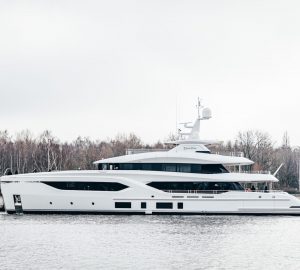
44m superyacht EXTRA TIME new to charter around the Western Mediterranean

Baglietto announces the launch of 41m luxury yacht ASTERA

Superyacht KISMET – the 122m Lurssen motor yacht the charter market has been waiting for

Another great special offer on board 36m motor yacht CALYPSO I
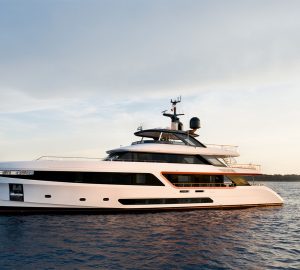
37m luxury yacht LEGEND offering unparalleled comfort on charters in the Western Mediterranean

Discover our Top 10 brand new yachts available for charter worldwide this year

Florida charter yacht REAL SUMMERTIME offering 10% discount

Looking ahead to the 2024 MYBA Charter Show in Genoa
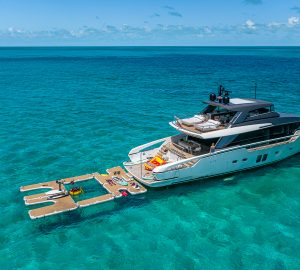
Discover summer in New England aboard a luxury charter yacht: Escape to this beautiful northeast corner of the USA
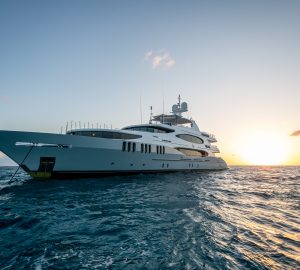
Last minute yacht charter deals in the Bahamas

Westport announce the first hull of their 36m W117 range is nearing completion

49m sailing yacht ANIMA MARIS is offering discounted rates for the remaining summer weeks in Croatia

Take advantage of the exceptional 15% discount by 44m charter yacht BLISS in Greece
Screen Rant
The below deck crew's salary & how much they make on the show.

Your changes have been saved
Email Is sent
Please verify your email address.
You’ve reached your account maximum for followed topics.
20 Best Reality TV Shows Right Now
Ben willoughby refuses to work with this below deck star again, below deck reveals the dangerous reason captain kerry could’ve fired ben willoughby.
- Crew members on Below Deck not only get paid for their job on the superyacht but also receive a fee for appearing on the reality series.
- The cast members of Below Deck make impressive salaries for working just four months out of the year.
- In addition to their salaries, the crew members also receive tips from the guests on the yacht, which can be substantial.
Not only does the crew on Below Deck get paid for their designated job, but they also receive a fee for appearing in the reality series. The franchise features long-time and new crew members eager to make a name for themselves in the yachting industry. Those who join Below Deck use the platform to help advance their careers by appearing on TV. While the work on a superyacht might seem hard, the cast's compensation makes it all worth it.
The popular Bravo reality series Below Deck hit viewers' TV screens for the first time in 2013. Since then, the show has garnered quite a large following, with the binge-worthy series Below Deck as one of the highest-rated shows on Bravo. After being on for so many years, there are questions regarding how much the cast makes, both for being part of the show and for their regular crew duties. For only working four months out of the year, the cast creates an impressive salary that would have anyone convinced yachting is a good career choice.
Reality TV is more popular than ever. With so many to choose from, here are some of the best reality TV shows to stream or watch right now.
The Below Deck Crew Makes A Salary & An Appearance Fee
According to Refinery29 , the cast of Below Deck makes quite a hefty salary for simply doing their superyacht job. For example, on a yacht the size of the My Seanna from Below Deck , a second and third steward makes about $5,000 monthly, while a chief steward brings in around $5,500 to $6,000 monthly. The chef makes about $7,000-$10,000 a month, depending on experience and training. The deckhands usually make around $3,500-$4,500 a month, while a bosun would make a little more at approximately $5,000 monthly.
The Below Deck Crew Also Brings In Tips
The crew even receives tips from the guests on top of their salaries. On Below Deck , they usually bring in around $15,000 per person in tips for about six weeks of work. Plus, the team does not work a whole yacht season, so they likely make more as they move from boat to boat. The Captain usually makes between $150,000 to $210,000 a year working on a 185-foot superyacht , assuming the Captain is working full-time. Additionally, the Captain can make up to $100,000 on top of the salary they are getting if they charter their yacht for the entire year.
On top of the money they make on the yacht, the crew also gets a small fee for appearing on Below Deck . According to Page Six , the crew makes about $5,000-$6,000 per month. Ashley Marti from Below Deck Sailing Yacht season 3 confirmed this and believes the Bravo pay discrepancy with Below Deck is unfair. The Real Housewives makes upwards of $1 million per season, while the Southern Charm cast makes around $25,000 an episode.
Since Bravo has created such a cult following in the past few years, many doors open for the cast members they hire. Now, crew members from any Below Deck series can make appearances for a small fee and profit from their fame on social media. In short, it pays to work on a yacht and to appear on a reality TV show.
Below Deck airs Mondays at 9 p.m. EST on Bravo.
Sources: Refinery29 , Page Six
Below Deck is a popular reality TV franchise that focuses on a group of crew members as they work on luxurious yachts and cater to their client's needs. After the original series proved to be a success, Bravo developed a handful of spinoff shows including Below Deck Selling Yacht, Below Deck Adventure, Below Deck Down Under, and Below Deck Mediterranean.
- Below Deck (2016)
Essential Guides
Ocean Mapping
New to Yachting
- Mar 11, 2021
Salary is generally one of the top motivators when choosing a job onboard a yacht, yet it is usually one of the best-kept secrets within the industry.
When negotiating the final salary, it's important that both the employer and employee have an idea of what the standard is for that particular position. This will help keep the transparency and build trust.
To keep their finger on the pulse of the industry and understand the changes that are happening within, YPI CREW set off to launch the yachtingsalaries. com website in 2016. There, every crew member in the industry is welcome to enter their yacht crew salaries along with the position they serve on a yacht. The process is completely anonymous and serves as a way of monitoring the industry's yacht crew salary movements. Yacht crew can also visit the site to check the anonymous data their peers have entered for reference.
The Importance of Yacht Crew Salaries Reports
Informed employers recognise that in order to attract the top level of talent and experience for a particular role, one of the strongest influences they have is the salary they can offer. To stay competitive within the yachting industry you have to offer competitive yacht crew salaries that reflect the current marketplace. And in order to do this, you have to know what the current market rate is.
Equally, employees can use a yacht crew salary report such as this as a guide point to get an idea if a job offer is reflective of the industry and the role they serve.
The Crew Salaries Data and How We Collect It
In 2016, YPI CREW launched a peer-to-peer salary comparison website for the yachting industry. Here, anyone working in the industry is welcome to anonymously enter their yacht crew salary along with their rank.
has so far attracted over 5.655 entries since its launch in 2016, providing an informative yacht crew salary guide for employers and employees. Best of all, the salary data is free for anyone to access.
The figures shown here are median values of the real salaries entered by yacht crew. They can be used as orientational figures but the real salary offered during the recruitment process will vary depending on the candidate's experience, training, certificates, and additional skills. This is why, when looking for work, it's important to have someone guiding you and championing your skills and experience.
All yacht crew salaries are expressed in euros. Please note that the blanks in the graphs are due to either lack of entries for that particular category or the nonexistence of a role in a specific segment. For example, there are generally no third officers on yachts smaller than 50 meters.
To visit the site to contribute your salary or conduct a free search of the salary database, visit
Data presented here is collected from anonymous yacht crew members. It should not be seen as a definite portrayal of the current market but merely an informal indication.
As salary data is entered by members of the community the site works on an honesty system. There is really no incentive for contributors to mislead people about what they earn. Any inflated or inconsistent salary entries can be 'flagged' as suspicious by other members of the community or by YPI CREW and quickly removed from the system to ensure the accuracy of data is maintained.
Yacht Captain Salaries
347 captains have contributed their salaries. Of those, 287 (82%) are working on motor yachts and 60 (18%) on sailing yachts. This is coherent with the ratio of the global world yacht fleet. 83% of which are motor yachts and 17% are sailing yachts. Overall, only 33% of captains who contributed are on rotation. Rotation usually, if and when available, starts on yachts over 50m. When talking about sailing yachts, we didn't receive any entries for sailing yachts above the 51-65m segment. Also, salaries were on average slightly lower on sailing yachts compared to same-sized motor yachts.
Yacht Captains present the most senior management of a yacht, which is obviously reflected in the salary they command. Expectedly, with the size of the yacht increasing, so do salaries.
Experienced recruiters are invaluable at this level as they can definitely add value in the salary negotiation stage; it is their role to act as a middle person to ensure that, when a job offer is made, it is to all parties' satisfaction and is therefore accepted. They not only know how best to champion captains, their skills and experience at interview stage; they help craft and finesse a deal.

2020 Yacht Crew Salaries for Motor Yacht Captains

2020 Yacht Crew Salaries for Sailing Yacht Captains
Deck Crew Salaries
214 Deck Crew have contributed their salaries, broken down as 116 Chief Officers, 16 Second Officers, 12 Third Officers, and 64 Deckhands.
From the data, we see that fewer Chief Officers (43%) reported having a rotational position compared to Second Engineers (57%). However, they reportedly benefit more from rotation than Captains who are at 33%.

2020 Yacht Crew Salaries for First or Chief Officers

2020 Yacht Crew Salaries for Second Officers

2020 Yacht Crew Salaries for Third Officers or Bosuns

2020 Yacht Crew Salaries for Yacht Deckhands
Engineer Salaries
279 technical crew have contributed; 162 Chief Engineers, 60 Second Engineers, 16 Third Engineers, and 25 ETO/AVIT.
Overall, many more Engineers reported being on rotation than Captains. We see that 72% of Chief Engineers, 57% of Second Engineers and 56% of Third Engineers are rotational, along with 88% of ETO/AVIT Engineers.
For Chief Engineers we note that beyond the 66 – 80m segment, there is no data for permanent salaries. This reflects the engineering recruitment market where in fact, from +65m upwards, the market is rotation only, apart from a few exceptions. The same goes for Second Engineers and ETOs where permanent contracts on +65m yachts are for build contracts only. It is our experience that the market is rotation-only for Engineers on operational yachts over 65m.

2020 Yacht Crew Salaries for Chief Engineers

2020 Yacht Crew Salaries for Second Engineers

2020 Yacht Crew Salaries for Third Engineers

2020 Yacht Crew Salaries for ETO, AVI & Electrical Engineers
Chef Salaries
65 yacht Chefs contributed with their salaries, of which 50 were Head Chefs and 15 Sous Chefs.
It is our experience that at the point of recruitment on yachts +50m, most yacht Chef jobs offer some sort of rotation, so it surprising that only 26 % of Chefs who contributed are on rotation.

2020 Yacht Crew Salaries for Yacht Head Chefs

2020 Yacht Crew Salaries for Sous Chefs
Pursers & Stews
34 Pursers, 61 Chief Stews, and 22 Second Stews contributed their salaries.
Pursers, after Engineers, are the category who most have access to rotation. 59% of Pursers reported having rotation whilst only 18% of Chief Stews said they benefit from that perk.
Our experience is that in the past year, perhaps due to Covid-19, salaries offered to Stews were somewhat lower than the year before.
This underlines again the added value of registering and teaming up with recruiters who have their fingers on the pulse and are able to assist in negotiating the best conditions for job offers. Each situation is unique. Likewise, the same recruiters will advise Captains on the state of the crew market and how to position themselves in terms of conditions and salary to attract the best suitable, interested and available candidates

2020 Yacht Crew Salaries for Yacht Pursers

2020 Yacht Crew Salaries for Chief Stews and Stewardesses

2020 Yacht Crew Salaries for Second Stews and Stewardesses

2020 Yacht Crew Salaries for Yacht Stews and Stewardesses
Most read articles

Tips & Tricks
How many crew members are needed on a yacht?

How to Find A Caribbean Yacht Job

Yacht Job Offers
Open yacht crew jobs in March 2023

How to Become A Yacht Purser: Interview with Purser Trainer Angela Wallace

YACHT CREW GUIDES
IS YACHTING THE RIGHT CHOICE FOR ME?
Essential yacht guides

Mandatory certificates

What you need to know about B1/B2 visa

How to prepare for a yacht interview?
Read more latest news

Embarking on an Engineering Career in Yachting: Crafting Your CV

YPI CREW is a proud sponsor of the ‘Seas the Day’ Ocean Rowing Team

Open Yacht Crew Jobs In April 2024

YPI CREW Yacht Crew Salaries Report 2020
INDUSTRY NEWS

HOW TO WRITE A MEMORABLE YACHTING CV

YACHT CREW SALARY GUIDE
Error 404 — page not found, we’re sorry, we couldn’t find what you were looking for.
Please return to the YPI CREW homepage
Let’s get started. Call us on +33 (0)4 92 90 46 10 or email us.
Our mission, vision and values, mlc 2006 compliance, essential guides, yacht crew positions.
Chief Officer
Second Officer
Third Officer
Chief Engineer
Interior Crew
Head of Service
Head of Housekeeping
Specialist Positions
Spa Manager
Spa Therapist
Personal Trainer & Yoga Instructor
Hairdresser
Mandatory Certificates
B1/b2 visa information, how to write a memorable cv, how to prepare for an interview, yachting seasons, yacht crew salary guide, is yachting the right choice for me, cv templates, ocean mapping, new to yachting.
+33 (0)4 92 90 46 10
The Ultimate Guide to Yacht Crew Salaries
- by yachtman
- September 16, 2023 August 26, 2023

Yacht crew salaries – a topic of intrigue for many. If you’re asking yourself how much these professionals make, this guide is for you. Here, you’ll find all you need to know about yacht crew salaries.
Factors like the size and type of the yacht, its location and cruising itinerary, all influence pay rates. Moreover, experience and qualifications of the crew matter too when it comes to salaries.
In addition to the usual suspects, there are other unique details to yacht crew salaries. For example, some yachts reward their crew for excellent service or guest feedback. So hard work can bring you more than just a base salary.
Let me share a true story. Sarah is a highly experienced chef aboard a luxury superyacht in the Mediterranean. With her culinary skills and extensive training, Sarah earns a salary that reflects her expertise and talent.
Yacht crew salaries are a complex mix of vessel type, location, qualifications, and performance-based rewards. By exploring this guide, you’ll gain valuable insights into this fascinating aspect of the yachting industry. Let’s get started!
Understanding the yacht crew salary structure
Salary structure for yacht crew is key to understand when wanting a career in the yachting industry. See the following breakdown of positions and their corresponding average monthly salaries:
Aside from these positions, experience, qualifications and yacht size can affect salaries. Gratuities can boost earnings too.
It’s important to be aware of trends when it comes to salary structure. Demand for experienced crew has been growing due to luxury yacht vacations. Salaries have also been rising.
It’s essential to know the yacht crew salary structure if you want to pursue a career in the yachting industry. Knowing average salaries and keeping up with trends will help you make smart career decisions.
Factors that influence yacht crew salaries
Various factors impact yacht crew salaries, like experience, job position, and yacht size/type . Experience enhances earning potential, while captains/engineers earn more than deckhands/stewards. Larger yachts often offer higher wages, and yacht type impacts specialized skills compensation. Certifications, language proficiency, and additional skills also factor in. According to SuperYachtTimes, certain destinations offer more competitive remuneration packages due to market demands and living costs variations. When considering a career in this field, take these factors into account to shape your earning potential.
How to negotiate yacht crew salaries
Here’s a guide to help you negotiate yacht crew salaries and get the best pay package:
- Do Research : Learn the industry standards for yacht crew salaries. Look into job roles, experience levels, and vessel types to set a benchmark.
- Assess Yourself: See how your skills, qualifications, and experience compare to other crew. Show any special strengths or certifications that could get you a higher salary.
- Get Ready to Negotiate: Prepare evidence for your desired salary range. Be ready to show your successes, awards, and extra value.
- Pick the Right Time: Time is key when negotiating salaries. Look for moments when your employer is okay with it, like during reviews or contract renewals.
- Show Your Case: During talks, explain why your salary should be higher, but stay professional and respectful. Highlight how you’ve helped the team or operations.
- Look at Non-Financial Benefits: If a raise isn’t possible now, try longer vacations, better housing, or professional development to boost your package.
Remember, negotiation is an art and needs both parties’ needs and expectations. By following these steps and customizing them to you, you’ll ace salary talks with confidence.
Pro Tip: Stay open to compromise, but aim higher than your target salary range to have some room to move without undervaluing yourself.
Expected salary ranges for different yacht crew positions
Salaries for yacht crew members vary greatly , depending on their position and experience. Here’s a look at the expected salary range for different roles in the yacht industry:
Note: These figures are estimates, and can change due to yacht size/type, location, and individual skills/certs.
To increase earning potential, get specialized training/certs related to your role. Qualifications make you more appealing to employers. Network within the industry. Go to events and join pro orgs – meeting people who can give valuable connections. Building relationships with captains/brokers can get you better jobs with higher salaries.
Maintain professionalism and dedication at work. Yacht owners value crew members who show reliability and hard work. Going above and beyond can help you stand out when it’s time for promotions/salary negotiations.
By following these tips and investing in your skills/network, you can make the most of the yacht industry.
Tips for career advancement and higher salaries in the yacht industry
Seek out chances to advance your career, such as going to industry conferences or getting certifications. Make connections with important members of the yacht industry, both on and offline. Doing this can give you access to job openings and mentors. Show off your skills through a resume and cover letter when applying for jobs. Showcase experiences and accomplishments that will make you attractive to employers. Be open to taking on different jobs or tasks to get varied experience and make yourself more marketable.
In addition, stay informed about current industry trends. Find out about new tech, regulations, and best practices. This way, you’ll be seen as an invaluable asset to the yacht industry.
As an example, Sarah started as an entry-level stewardess but quickly rose through the ranks. She was recognized by her co-workers and bosses. In a few years, Sarah became chief stewardess on a top yacht. She was successful due to her excellent skills and adaptability. Now, Sarah earns higher salaries and has more opportunities for career advancement.
By following these tips, as well as being determined and hardworking, you can enhance your career prospects in the yacht industry and make more money.
Analysis of yacht crew salaries shows insights, both for inexperienced and experienced crew members. High demand for yachting professionals has created competitive compensation packages, plus yearly increments and benefits like accommodation, travel allowance, and food. Salary structures vary based on factors like experience level, yacht size/type, job role, and location.
It is vital to look at certifications and specialized skills for understanding crew members’ earning potential. Get additional qualifications like STCW certificates or culinary training to increase the chances of getting higher-paying jobs. Positions like diving instructors or onboard beauty therapists come with attractive remuneration packages.
To not miss out on great opportunities, stay up to date with industry trends. Network with fellow professionals through conferences or online platforms. By staying connected and informed, you can maximize your earning potential .
Frequently Asked Questions
FAQ 1: What factors determine yacht crew salaries?
Answer: Yacht crew salaries are determined by various factors such as experience, position, size and type of yacht, level of qualification, location, and the owner’s budget.
FAQ 2: What are the typical positions and salary ranges in the yacht industry?
Answer: Typical positions in the yacht industry include captain, first mate, chef, stewardess, and deckhand. Salaries can vary significantly, with captains earning $80,000 to over $200,000 per year, while deckhands may earn $30,000 to $50,000 per year, depending on experience and other factors.
FAQ 3: Are there any additional factors that can affect yacht crew salaries?
Answer: Yes, additional factors can include bonuses, tips, benefits, overtime pay, and the length of the working season. These factors can significantly impact the overall salary package for yacht crew members.
FAQ 4: Are there opportunities for career advancement and salary growth in the yacht industry?
Answer: Absolutely! Yacht crew members can advance their careers and increase their salaries by gaining additional qualifications and experience. Progressing to higher positions such as chief stewardess or captain can lead to higher income and better job prospects.
FAQ 5: Do yacht crew members receive any additional benefits besides their salaries?
Answer: Yes, besides their salaries, yacht crew members often receive additional benefits such as free accommodation and meals onboard, health insurance, retirement plans, transportation allowance, and the opportunity to travel to exotic locations.
FAQ 6: How can I find accurate and up-to-date information about yacht crew salaries?
Answer: It is recommended to consult reliable sources such as industry publications, yacht crew agencies, and professional associations specializing in the yacht industry. They can provide accurate and up-to-date information on yacht crew salaries.
Leave a Reply Cancel reply
Your email address will not be published. Required fields are marked *
Save my name, email, and website in this browser for the next time I comment.
Working On Yachts
There are currently over 15,000 yachts in the world large enough to require professional, qualified yacht crew and as a result this industry is growing rapidly each year.
A career in yachting can be rewarding, exciting and a wonderful opportunity to travel the world and explore new horizons!
Wherever there is water, you have the potential to go. Traditionally the yachting industry in the Mediterranean runs from April until September and from November to April in the States & Caribbean. Having said that, the possibilities are endless with many yachts circumnavigating the world.
Yachting is an eye opening, ultimately fun industry that demands hard work, perfection and attention to detail. We work with yacht crew every day and have a deep insight into what new crew should do to make the most of their career. Here are our top ten tips for starting out.
You cannot work on board a luxury yacht without getting your basic qualifications first. Bluewater offers a full range of crew training courses for those just starting in the industry:
- STCW 95 Basic Training (Europe) 5 Day Course
- Powerboat Level II 2 Day Course
- Interior Introduction 3 Day Course
- AEC 1 5 Day Course
We have a sample copy and lots of relevant advice on creating your first yachting CV within our 'Your CV' section.
Certain times of year are more favourable for new crew looking to join the industry. If you are going to Antibes or Palma, we advise end of March/April. Fort Lauderdale is different in that it is sunny most of the year, however there is a peak recruitment season around November each year.
In every yachting hub you will find english speaking bars and cafes filled with yacht crew. Make sure you go and explore to build your network within yachting. Although global, it is a small industry so make sure to present yourself professionally.
Finding your first position in yachting is the hardest. Make sure you are dock walking, looking for day work opportunities and handing out your CV. You may find that one day's work leads to a permanent role or other job interviews.
Read websites, follow yachting news, learn from other crew who were in your 'deck shoes' a few years ago. Good examples of yachting websites & magazines are:
- Bluewater bluewateryachting.com
- Dockwalk dockwalk.com
- The Crew Report thecrewreport.com
- The Triton thetriton.com
Apply for jobs, manage your course bookings and sign up for events.
You can buy pay as you go SIM cards either in newsagents or specialised telephone shops around the Mediterranean. This will help to save you money when job hunting!
Captains check Facebook and Twitter pages before interviews. Make sure any public images of you are professional and will not reduce your chances of employment. Once employed be sure to avoid any posts about your yachts, current location and inappropriate images.
A smart, professional appearance will win over shorts and a beach top.
The most important aspect when you are looking for work is to make sure your CV is up to date, well written and includes any relevant experience that you might have.
It is best to emphasize any hospitality experience or customer service skills you may have had, such as waitressing, hostessing, silver service, bartending, cooking, nanny/au-pairing, babysitting, flower arranging, cleaning and/or laundry experience.
Should you wish to join the engineering department, make sure you include all mechanical experience and qualifications, including all work done in refrigeration, air conditioning, work with engines, and any electrical work, electronics or AV/IT.
The most important aspect to include is any recreational sailing experience you may have had. If you are also qualified or experienced in woodwork or carpentry, have painting, polishing, varnishing know-how, then that is also great. In addition any diving, sailing, fishing, any water sports background are all fantastic skills that are easily transferable.
We deal with a great multitude of chef positions, ranging from crew chef to head chef. Most positions will require some form of culinary training, however some crew succeed in entering this department through the stew/cook route on a smaller yacht.
When filling in your online profile with us, make sure to only select positions that you are qualified to do onboard. Selecting more than 3-4 positions on your profile can confuse potential employers and effect our search results.
Your CV should be no more than two sides of A4, including your photograph (in colour, face on, without sunglasses).
Your CV should be in a word format to ensure it can be opened easily by all employers.
List all recent contact information, references and work history.
Including a personal statement, along with a clear objective can help distinguish you from other candidates and helps prospective employers grasp your long term goals.
Don't give employers an excuse to dismiss your CV, review and spell check it!
Salary Guidelines

Knowledge is power and the more you research, the more informed & on the ball you will be.
Make sure you have a printed copy of your CV with you and always arrive early and dressed in a smart way. Research the yacht, make yourself prepared & don't be afraid to ask questions.
The key to getting your first job is to network! Always carry a copy of your CV with you.
Remember the industry is a tight, professional network therefore it is crucial to communicate with others, walk the docks, distribute your CV and register with crew agencies. Bluewater is one of the longest-established crew agents - we have been finding people yacht jobs since 1991!
Keep the agencies up to date! Always make sure your profile has the correct location and contact numbers for you so we can get hold of you when we have the perfect role for you.
Your profile is essential to us finding you work, both now and in the future. We rely on the information you input to match you to the right jobs, so please make sure it is up to date and at least 85% complete. We receive thousands of vacancies each year, and search our database for the best candidates for each one... You will hear from us more often if you are checking in regularly! Once you find work you can set your profile to 'Not Available'.

Yacht Crew Positions and Salaries
The organisational structure onboard a superyacht follows a strong hierarchy based upon a military model. Exact job duties and lines of authority are set and strictly adhered to. This hierarchy is followed on the vast majority of yachts; however, responsibilities of the crew on smaller yachts are often merged.
There are four departments on yachts with clear organisational structure:
- Deck (including Bridge) – Safety, passage delivery, maintenance of the yacht's exterior, guest outdoor activities
- Engineering – Safety and smooth operational running of the yacht
- Interior – Housekeeping, guest wellbeing, activities, accounting
- Galley – Food preparation, stock control, hygiene, galley maintenance
The top of the hierarchy on each yacht is the Captain , who reports to the yacht owner either directly, or through a representative or a yacht management company.
Salaries vary and depend on the yacht size, use, type and location, as well as the experience and qualification of the crew member. We included typical salaries of crew based on the data available from reputable industry sources, as well as our research of over 60,000 crew registered with us.
Deck Positions
The primary duty of the Captain is the overall safe manning and operation of the yacht. Yacht Captain is responsible for the vessel, yacht crew, owner and guests, including personnel management, shipyard/project management, legal and regulatory compliance, accounting, achieving owners' objectives, and answers to the owner regarding all decisions.
First Mate / Chief Officer
The First Mate or Chief Officer is the right hand of the Captain. Takes command of the yacht from Captain when required. Shares Captain's responsibilities as required.
Bosun / Lead Deckhand
Bosuns are usually experienced Deckhands with additional responsibilities. They are in charge of Deckhands onboard the yacht and often spend a lot of time with guests during outdoor activities. The Bosun is normally the main tender driver.
Responsible for the maintenance of the exterior of the yacht and keeping it in pristine condition at all times. Deckhands also assist in maintaining, cleaning and operating yacht's tenders.
Engineering Positions
Chief engineer.
Responsible for the Engineering Department and for all technical aspects of the boat and its equipment. The Chief Engineer's duties include overseeing all mechanical and electrical operations, ensuring all planned maintenance takes place and liaising with subcontractors.
Second / Third Engineer
The Second and Third Engineers report directly to the Chief Engineer. They assist in maintaining all mechanical and electrical operations of the yacht.
ETO / AV/IT Officer
Electro-Technical Officer (ETO) and AV/IT Officer are in charge of daily maintenance of all electronic, computer, audio/visual and communications equipment and their efficient operation. This includes the radio, radar, telephones, satellite communications, navigation systems, computers, Internet connection, interior equipment (TVs, sound systems), etc.
Electrician
The Electrician is responsible for maintenance of all electrical circuits onboard the vessel, circuit breakers, switches, lighting, batteries, etc.
This is an administrative position on large yachts. The Purser is responsible for all operations in the interior department, including inventory, purchasing, provisioning, accounting, organising guest activities, and assisting the Captain with the yachts paperwork.
Chief Steward(ess)
Duties are similar to those of other Steward(ess)es onboard the boat, but on a more senior level, including managing the interior department and training. Small yachts with less crew do not have a Purser. The Chief Steward(ess) is in charge of all the responsibilities normally carried out by the Purser on large yachts.
Steward(ess)
Steward's or Stewardess's main responsibility is to maintain the interior of the yacht and provide the highest standard of care to the owner and guests. They serve food and drinks, prepare guest activities, pack and unpack luggage and are on call for anything that the guests want anytime day or night. On some yachts, they help the deck crew moor the yacht.
The Head/Executive Chef onboard a luxury superyacht is a culinary trained professional responsible for the overall management of the galley department on larger yachts, including guest and crew meals, provisioning, food safety, maintaining strict hygiene standards and financial/budgetary administration.
Assists the Head Chef in all aspects of galley duties. The Sous Chef may be required to independently provide crew meals or guest meals at the direction of the Head Chef.
Crew Chef / Cook
Large yachts employ a separate crew and guest chef. The Crew chef provides meals for the crew.
Other Positions
Many yachts, especially the large ones, have several additional positions. These are often combined with primary roles, e.g. Stewardess / Masseuse or Deckhand / Dive Instructor . The most common are:
Career Advice:
Email address:
Remember me Forgotten password?
Password Reset
Enter your email address and we will email you a password reset link.
Email address:

- Career Advice
- Salary Guide
- Dockwalk Presents
- Digital Dockwalk
Here’s the Lowdown on Yacht Crew Tipping

Louisa Beckett is the former editor of Motor Boating, ShowBoats International, and Southern Boating magazines, and a longtime contributor to Dockwalk. Over her career, she has written about a wide variety of vessels ranging from Sea-Doos to superyachts, and has had many adventures on the water, including riding in a U.S. Coast Guard “rollover” boat in heavy surf off Cape Disappointment, Washington.
While it’s customary for guests, especially on charter yachts, to leave a gratuity for the crew, you shouldn’t expect to walk away with “stacks of cash” after every trip.
The custom of guests leaving a tip for the crew at the end of their yacht vacation has become so ingrained in the industry that most crew working aboard charter yachts expect to be rewarded for their efforts with a pile of money on top of their salaries.
“I’ve had charters where we’re anchored in the BVIs, the guests had left, we’re eating leftover lobster, drinking leftover Champagne…counting our stacks of cash,” Chief Stewardess Kate Chastain of Below Deck told ET during an interview. “I felt pretty special at that moment.”
The reality isn’t always so rosy, however. There are a number of factors that play into the amount crew receive as a gratuity — if the guests leave anything at all.
Not Mandated
New crew may not understand that gratuity is entirely up to the charter client, and tips are earned rather than being mandatory. The current MYBA Charter Agreement template, widely used in the Med and Caribbean, has sections devoted to financial matters like the charter fee, VAT (if applicable), APA, security deposit, and broker’s fee, but not to the gratuity.
New crew may not understand that gratuity is entirely up to the charter client, and tips are earned rather than being mandatory.
There is a “Special Conditions” section at the start of the MYBA Agreement where the charter manager may write in stipulations for the charter such as “no smoking except in designated areas,” “no pets,” and “children must be supervised by an adult charter guest or nanny at all times.” It’s also common for him or her to include a clause related to tipping in this section, stating: “Gratuities are left solely at the charterers’ discretion…,” and providing guidelines as to the percentage of the yacht’s gross charter fee customary for clients to leave as a tip (usually given as a range). The gratuity clause is only a suggestion, however, not a binding part of the contract.
“I sometimes have crew who get upset when they do not get a certain amount [for a tip],” says Capt. Jason Halvorsen of the 141-foot expedition yacht M/Y Marcato . “I tell the crew that if you made a dollar, then you did okay — anything above that is great.”
The good news is that yachts typically don’t reduce their employees’ salaries by what they expect the employee to make in gratuities. “We do not take charter tips into consideration,” Capt. Halvorsen says. “I pay all my crew based on an industry standard, and if you get tips, it’s over and above that.”
Yacht Crew Placement Manager Jill Maderia of Denison Yachting in Fort Lauderdale adds, “It’s always beneficial to ask if there are charters booked and how many have been confirmed when placing crew on board. It gives crew a good idea how the season may go and if it will be busy or will it be a mix of owner vs. charter trips.”
No Standard Percentage
“[The average charter tip] can range depending on the yacht, the charter broker, and the crew,” says Katie Macpherson, a charter consultant with IYC in Palm Beach, Florida . In many cases, especially with first-time clients, it’s left up to the broker who books the trip to educate the client about charter etiquette, including tipping practices. One captain said not all charter brokers do a good job of this, however. “Not usually, NO…,” he says. “Only the really better ones and they are far and few between.”
In many cases, especially with first-time clients, it’s left up to the broker who books the trip to educate the client about charter etiquette, including tipping practices.
MYBA does provide charter guidelines for captains and brokers, which state: “…. Brokers generally suggest to charterers that a gratuity calculated between five percent and fifteen percent of the contracted gross charter fee only is appropriate if the crew has given excellent service. However, it is important to understand that a charterer is under no obligation to leave a gratuity and at no time should a gratuity be solicited, either verbally or in written form, when settling the final account.”
Based on her experience, Maderia quotes a slightly higher percentage: “Charter managers and brokers encourage clients to tip fifteen percent to twenty percent, though tipping can vary in different countries and what might be customary [to their] culture.”
Tipping Cultures
Nicci Perides of Burgess in London quotes her firm’s charter team as saying it’s not uncommon for clients to leave crew gratuities of less than 10 percent of the charter rate. “It doesn’t necessarily mean anything was wrong [with the charter]; tipping might not be in their culture,” she says.
“Some cultures are not used to tipping,” Capt. Halvorsen agrees, adding, “Americans are used to it, and eighty-five percent of our charters have had American clientele.” While U.S. citizens typically tip in the 15- to 20-percent range, the customary range for Europeans is around 10 to 15 percent. According to the Travel Channel, 10 to 15 percent also is the customary range for gratuities in the Middle East. Japan, however, has a “no-tipping” culture where some people feel that leaving a gratuity actually is rude.
While U.S. citizens typically tip in the 15- to 20-percent range, the customary range for Europeans is around 10 to 15 percent.
Private vs. Charter Crew
Private yacht owners often want to acknowledge crew financially for exceptional service, but this can be a slippery slope. “A lot of owners ask me for advice on how that works, especially if they are new,” says Michael Reardon, president and owner of Reardon Yacht Consulting . “It’s much appreciated [by the crew], but then does it become an expected entitlement? It’s supposed to be a reward for going above and beyond.” Reardon adds that some owners will treat their crew to an annual dinner at a memorable upscale restaurant rather than handing out cash tips.
If the owner’s private guests tip the crew, it can also be a difficult issue, since it can place the owner and his guests in an awkward position regarding hospitality and obligation. “My boss says no gratuities [from his friends], but they can give a ‘gift,’ like a couple of hundred bucks,” Capt. Halvorsen says. “Sometimes we appreciate it a little more, even if it’s less money because we weren’t expecting it.”
Splitting the Tip
Although some crew, like the chief stew, chef, and deckhands who work with the tenders and toys, may play a larger role in entertaining the guests, charter captains say those crew shouldn’t expect to get bigger tips than other crew who are seen less frequently by the guests. “All gratuities are divided equally between all crew. Everyone plays an important role in the success of a charter,” says Capt. Bob Corcoran, master of the 252-foot Devonport M/Y Samar . He adds that this practice helps to prevent conflict on board. “Keeping all equal has been a good policy,” he says.
“Everyone gets the exact same amount of money,” Capt. Halvorsen agrees. “Maybe [the guests] don’t see the engineer the whole time because he was below keeping the toilets running or the A/C on….” He adds, “If [the tip amount] doesn’t come out evenly, I will bump the crew up to an even number and take the shortage myself.”
“All gratuities are divided equally between all crew. Everyone plays an important role in the success of a charter,” says Capt. Bob Corcoran, master of the 252-foot Devonport M/Y Samar .
Brokers usually recommend their clients give the captain an envelope with the entire crew gratuity, in cash, at the end of the trip and let them distribute it. According to the Burgess charter team, “[Clients] generally follow these guidelines, giving the tip to the captain and allowing him to manage it,” Perides says.
That doesn’t mean the clients take their broker’s advice, however. Some will persist in singling out the captain or another crewmember for an extra bonus. “I had clients once give me envelopes for everyone,” Capt. Halvorsen says. “I asked the crew, can we just split it, and they agreed. No one had even opened their envelope yet.”
Bigger Boats, Bigger Tips?
Crew working their way up to larger yachts usually can expect a pay raise, but it doesn’t always follow that they will receive bigger tips as well. “The bigger the boat doesn’t necessarily mean you’re going to get more money,” Capt. Halvorsen says. “As I’ve grown into bigger and bigger boats, the charter rates go up and the [tip] percentage goes up, but you are splitting it with more crew.” For example, if a superyacht that commands a $300,000-per-week charter rate has 15 crew on board, a 10 percent gratuity of $30,000 nets out to $2,000 per crewmember. A four-person crew on an $80,000-per-week yacht could get exactly the same tip.
Capt. Halvorsen adds that gratuities are only paid as a percentage of the charter rate, not on the APA. “If you are on a boat that burns more fuel, that doesn’t mean you need to tip better,” he says.
Tipping & Taxes
The industry veterans recommend that yacht crew include tips with their salaried compensation when they file their annual taxes. Due to the international nature of the industry, however, with crew hailing from all over the globe, most captains and yacht managers are forced to leave it to the crew to self-police on this issue. “That is up to the individual crewmember,” Capt. Corcoran says.
The Right Attitude
USA Today recently published a story citing a growing “do-not-tip” movement. “Travelers say the ever-present tip jars and outstretched hands leave them confused and frustrated,” it read in part. “Gradually, consumers are easing up on gratuities — and businesses are moving away from compensating staff with tips.”
“I never tell the crew what they get until the charter clients [leave],” he says. “I want the crew to behave the exact same way until the guests are gone.”
Reardon says he also has witnessed a change in attitude toward tipping in the industry over the years. While chartering a yacht generally comes with fewer headaches than owning one, he recalls that an owner recently told him: “When you charter, it’s fun; it’s for a limited time…[but] there is a sense throughout that no matter how good a job [the crew] do, they are only doing it for a tip.”
Halvorsen recommends captains wait until all the guests have left before dividing up the gratuity amongst the crew, so the amount they receive won’t influence them, consciously or unconsciously. “I never tell the crew what they get until the charter clients [leave],” he says. “I want the crew to behave the exact same way until the guests are gone.”
Capt. Corcoran agrees. “Always stress that it is a ‘gratuity’ and therefore should not affect the level of service.”
This article originally ran in the February 2021 issue of Dockwalk.
More from Dockwalk
Most popular on dockwalk.
- Inquire Now
- YACHT SEARCH
- Motor Yachts
- Sailing Yachts
- $1 – $25,000 Yachts
- $26,000 – $50,000 Yachts
- $50,000 – $100,000 Yachts
- $101,000 – $200,000 Yachts
- $200,000 – ∞ Yachts
- Turks and Caicos
- Virgin Islands
- Spain & Balearic Islands
- New England
- Tahiti & South Pacific
- More destinations
- Charter Advice
How much does it cost to charter a yacht?
There are many things to consider and first time charterers can be left confused, that's why we've created a comprehensive guide to yacht charter prices (with a checklist).

The good news: It’s easy to grasp the basics of yacht charter pricing. And with one of our experts in your corner, we can help you more accurately estimate the cost of your next once-in-a-lifetime vacation.
The cost of a yacht charter is dependent on a number of factors, including the type of yacht, the charter destination, local taxes, and the base cost. (If the yacht has a celebrity owner, well that too, can add to the cost.)
Therefore, yacht charters have a wide range of base prices. That’s why charters can cost from $10,000 per week on smaller sailing yachts and catamarans, up to $150,000+ per week on the most luxurious motor superyachts.
What else can you expect to pay? This overview – a part of our planning resource, the Charter Advice Guide – offers an in-depth look at charter yacht costs.
Yacht Charter Price Structure: “All-Inclusive” vs “Plus Expenses”
In the world of yachting, two types of crewed yacht charters are available to you – “All-Inclusive” and “Plus Expenses” charter experiences. What do these terms mean exactly? Here’s a quick look:
- All-Inclusive Yacht Charters – Some charters (mainly catamaran and monohull charters in the Virgin Islands) offer all-inclusive rates. That means rates are based on the number of guests, and they include all food and drink, water sports, and fuel costs. Dockage and taxes, though, are usually charged separately.
- Plus Expenses Charters – Rates for larger motor yachts do not include running expenses, which must be paid separately. For these luxury charters, the base price is for the yacht only. Additional expenses, i.e. food, bar, fuel, dockage, port taxes, and other expenses, are charged separately. Most frequently, the running expenses are paid by an Advance Provisioning Allowance, or APA, which is typically 35% of the base price; this is an amount that’s paid prior to the charter.
Our chart below offers a quick overview of what’s included in both of these types of charters.

Average Yacht Charter Cost: Base Prices
What can you expect to pay for a catamaran, a sailing vessel, or motored yacht? Here’s a quick overview of the average cost to rent a yacht (not including extra expenses) for the most common types available:
Factors that Affect Yacht Charter Prices
Since charter yachts are privately owned, prices are set by the owner. This can explain, in part, the wide range of differences in price between boats of similar lengths. Yet, several other factors can significantly impact price, including:
- The Yacht – The year the boat was built, the builder, previous owners, and the boat’s selection of water toys can also increase the cost of a yacht. Boats can also develop a reputation, i.e. the largest or most luxurious, or having a famous builder or previous owner. Reputation can also affect pricing.
- Season – Prices typically increase in the high season – i.e. high summer in the Mediterranean or winter in the Caribbean – and decrease in low seasons.
- Destination – Your charter destination also plays a role in charter cost. For example, prices increase in areas without large charter fleets (i.e. the Galapagos), whereas Bahamas yacht charters, BVI charters , or Mediterranean yacht charter are priced more competitively.
Additional Costs Considerations on Yacht Charter
In addition to the cost associated with running the yacht and provisioning, there are a number of other costs that must be considered. These are the most significant:
Advanced Provisioning Allowance
The APA on Plus Expenses charters equals roughly 35% of the yacht’s base price. This is a fee that’s collected prior to charter, and it’s similar to an expense account the captain can access during the charter. At the end of the charter, you will receive a detailed accounting of your APA account, plus any unused APA funds in cash.
In the case of overages, you may be required to replenish the APA account during the charter. This can be done with cash, although many choose to set up accounts with their charter brokers , which can be accessed if requested by the captain.
Taxes and Value Added Tax (VAT)
Most boats – whether all-inclusive or Plus Expenses – will not include local taxes or a Value Added Tax into their charter rate. The charterer will be responsible for paying those taxes. Taxes range significantly by destination; here’s a look at some of yachting’s most popular destinations:
- The Bahamas – Tax: 4% plus 10% VAT
- BVI – Tax: between $6 and $16 per person per day, depending on the flag of the boat
- Croatia – VAT: 13%
- Florida – Tax: 6% for Broward County, 7% for Miami-Dade County
- France – VAT: 20%, however, 10% can be applied when an itinerary includes International Waters
- Greece – VAT: 12%
- Italy – VAT: 22%, however 6.6% (over 24m) and 8.8% (under 24m) can be applied when an itinerary includes International Waters
- Montenegro – NO VAT
- New England – NO TAX
- Spain – VAT: 21%
- Turkey – NO VAT
Charterers can purchase cancellation and curtailment insurance – which is similar to traveler’s insurance. This insurance can help cover costs if a charterer must cancel or shorten the charter. Charter brokers can help you weigh insurance options, and often offer several different options.
Crew Gratuity
While crew gratuity is certainly not mandatory, it is recommended, particularly if you were truly impressed with your charter experience. In general, crew gratuity is roughly 15-20% of the base charter rate, which is handed to the captain at the conclusion of your charter.
Delivery Fees
While these fees do not apply on most charters, you may be asked to pay delivery costs if you are not chartering in the yacht’s normal cruising ground. In most cases, you will only be required to cover the fuel for the trip.
Call Worldwide Boat today to learn more. Our Charter Specialists are here to assist you with every detail and explain all charter costs. Or read our Charter Advice guide for more information and tips for planning your charter vacation.
Showing 1–4 of 287 results
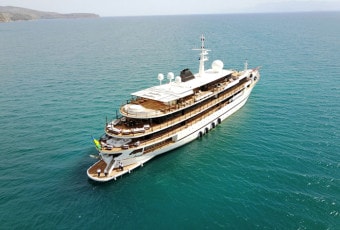
282.2ft / 84m
278.1ft / 83m
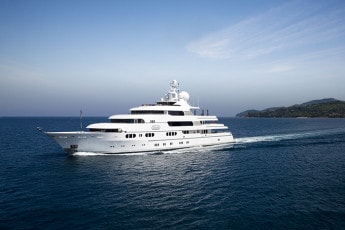
239.6ft / 71m
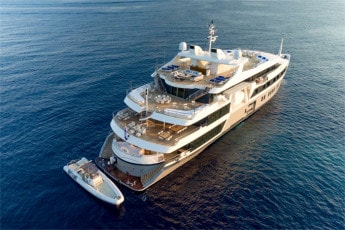
Serenity 236
236.3ft / 70m
Additional Charter Cost FAQs
What are standard private charter yacht prices?
There are a number of factors that affect charter yacht pricing. However, on average, a week-long private yacht charter costs anywhere from $10,000 on luxurious sailing yachts and catamarans, and up to $150,000 for superyachts.
What affects charter yacht prices?
There are several things that influence how much your yacht charter will cost. The type of vessel, charter destination, length of trip, base cost, time of year, and local taxes all make a difference.
How much does it cost for a crewed vessel?
Charter yacht prices do increase when hiring a crew along with the boat. At Worldwide Boat, we offer two types of crewed charter experiences: all-inclusive and plus expenses. An all-inclusive charter yacht includes accommodation for all guests, food and drink, water sport activities, and fuel costs – dockage fees and taxes are charged separately. A plus expenses experience accounts for just the yacht’s base price. Things like food, drinks, fuel, dockages, taxes, and other expenses are charged separately and are usually estimated to be about 35% of the base price.
What’s included in all-inclusive boat charters?
At Worldwide Boat, your all-inclusive charter experience includes a diligent and friendly crew, water toys, food, drinks, fuel, water and electric services, and occasionally diving experiences.
What are some additional charter boat costs to consider?
After finding a base price you’re comfortable with and evaluating your package, you’ll also want to consider delivery fees, crew gratuity, insurance fees, taxes, and Advanced Provisioning Allowance rates. If you are responsible for these fees, your crew will handle the necessary transactions on your behalf.
What does it cost to rent a 100- foot yacht charter?
This depends on what type of vessel you’re looking at and how long you’ll need it for. The average weekly cost of a 100-foot sailing yacht is between $50,000-100,000. A weekly 80-foot catamaran charter runs around $40,000-100,000, and a week-long 100-foot motor yacht rental is anywhere between $50,000-80,000.
Does the price to rent a yacht change depending on what type of boat it is?
Yes. Worldwide Boat offers sailing yachts, catamarans, and motor yachts. All of these vessels have different capabilities, but there are other factors that determine the price beyond what type of boat you choose. The year the boat was built, owner, availability of water toys, onboard amenities, and the ship’s reputation can all change how much the ship is priced at.
When is the high season for yacht charters?
The price of a yacht fluctuates depending on the season. A Mediterranean yacht charter cost rises in the summer and drops in the winter, whereas Caribbean boat charter prices are high during the winter and lower in the summer months.
How does my destination affect charter yacht cost?
The more remote an area is, the more expensive it will be to charter a yacht there. That’s because prices go up in areas that have fewer boats. If you were to travel somewhere like the Galapagos, which isn’t a typical yacht destination, you’d pay more than you would if you were traveling to the Caribbean.
How much do I tip the crew when reviewing my yacht charter expenses?
It’s not required that you tip your crew, but it is recommended and appreciated. If you had an enjoyable experience it’s considered polite to tip your crew anywhere from 15-20% at the end of your charter.
Go to Charter Advice
Set your search criteria to find the perfect yacht
- Alaska Australia Bahamas BVI Caribbean Croatia Florida France Galapagos Greece Indonesia Italy Malaysia Maldives Mexico Mediterranean New England Norway Spain Thailand Tahiti Turkey
- Motor Yacht Catamaran Sailing Boats
- 2 4 6 8 10 12 12+
Search by yacht name

IMAGES
VIDEO
COMMENTS
It is up to it. Common tips vary from 5% to 20% of the charter cost, sharing about 10% and split by all crewmembers. Living on a private yacht cannot provide all such advice, but it has its own crew benefits, including greater rest, longer vacations, rewards and also the prospect of the owner's unexpected donations. Such proprietors are often ...
The Results of the 2022 Salary Survey. Our annual salary survey provided some unprecedented insights to what captains and crew earned in 2022. As restrictions eased and the world opened up more, owners and guests have wanted to spend more time on board, and boats are, once again, willing to fly crew in. With some crew swallowing the anchor and ...
The biggest megayachts, meanwhile, exceeding 328 feet (100 meters) pay about 8,000 euros ($8,700) per month. Plus, the chefs have assistance from sous chefs and sometimes third chefs. Yacht crew salaries for interior departments saw mixed results. Junior stews typically earned the same regardless of yacht size, 2,500 to 3,500 euros ($2,700 to ...
Yacht Crew Salaries. ... dental insurance after a probationary period of 30 - 90 days is normal, as well as periodic performance evaluations for pay increases. ... and time off vary on a vessel's schedule, but 4 - 6 weeks paid holiday per year and a 5 - 6 day work week unless on charter is standard. Yacht Crew. Home Positions Register
Second Engineer: For 40m — 50m the salary is based on the candidates holding an AEC. For 50m — 70m the salary is based on the candidates holding a Y3 / SV Chief 3000kw and on rotation. If the role is permanent then an EOOW qualification is required and the salary would be 5 000—6 500€.
Apr 13, 2023. 2 min read. YPI CREW, a leading yacht crew recruitment company, has released its 2023 Yacht Crew Salaries Report following a positive and fast-paced year in yacht crew placement. The report outlines trends in the industry and emphasizes the importance of flexibility in attracting top talent. 2022 marked a significant shift in the ...
Yacht crew is a service job at its core, and every yacht owner is looking for service-oriented people who understand how to deliver a hotel-quality living and restaurant-quality fine dining. ... Private vessels usually offer higher base pay, as charter crew can earn tips on top of their base salary. Because of the demands of the lifestyle ...
Specifically, when comparing salaries in euros for a 50-meter yacht between 2008 and 2023, certain trends emerge. In the case of Captains, the industry average in 2008 ranged from 7,000 to 10,000 euros per month, while this year, it has extended from 7,000 to 15,000 euros per month. Similarly, Chief Engineers in 2008 were earning an average of ...
Superyacht Captain salary - €4,000 to €16,000+. A Superyacht Captain is responsible for all activity onboard, crew safety and well-being, and the experience offered to guests. The Captain is the owner's main point of contact on the yachts; whether things are going right or wrong, it can be a highly pressured and stressful job.
The salary guidelines are utilized by an array of industry professionals worldwide as a reliable benchmark for yacht crew salaries. This active data is taken from the thousands of live crew profiles who are placed on yachts by Luxury Yacht Group every year. New members joining the industry turn to the websites 'Department Descriptions' to learn the essentials before taking the plunge.
This is a very technical role that can pay well as you gain experience and obtain your licensing. Yacht Chef Salary. 20m-30m: $4000 - $5000; 30m-40m: $4500-$6500; ... Yacht Crew Salaries for Private vs Charter Yachts. There are two types of super yachts that require crew: Private and Charter yachts. The salaries for yacht crew differ slightly ...
pay scales for experienced deckhands / Lower salary reflects entry level range) 170ft - 200ft + $2,500 - $4,500 An entry level position / Duties will be assigned according to your rank / This is the size yacht where entry level crew are most commonly considered / License and certification not always required 100ft - 170ft $2,000 - $3,250
Depending on various factors, the captain could be paid $4,200 to $15,800 per month. Although this an extremely high pay rate, it requires decades of experience typically. Being in charge of the safety of passengers, crew members and potentially a $50 million yacht is serious business!
The occupations covered range from captains to deckhands and compare pay for permanent, private, rotation and charter crew: Find out how the charter industry measures up to the other sectors. ... permanent and private employment having the most stable salaries and charter crew the most variable: salary on a 51-65m superyacht was €6,500 per ...
According to Page Six, the crew makes about $5,000-$6,000 per month. Ashley Marti from Below Deck Sailing Yacht season 3 confirmed this and believes the Bravo pay discrepancy with Below Deck is unfair. The Real Housewives makes upwards of $1 million per season, while the Southern Charm cast makes around $25,000 an episode.
Yacht Captain Salaries. 347 captains have contributed their salaries. Of those, 287 (82%) are working on motor yachts and 60 (18%) on sailing yachts. This is coherent with the ratio of the global world yacht fleet. 83% of which are motor yachts and 17% are sailing yachts. Overall, only 33% of captains who contributed are on rotation.
Updated Feb 10, 2024. The estimated total pay for a Charter Boat Crew is $152,431 per year, with an average salary of $117,066 per year. These numbers represent the median, which is the midpoint of the ranges from our proprietary Total Pay Estimate model and based on salaries collected from our users. The estimated additional pay is $35,365 per ...
Salary structure for yacht crew is key to understand when wanting a career in the yachting industry. See the following breakdown of positions and their corresponding average monthly salaries: Position. Monthly Salary (Average) Captain. $10,000 - $20,000. First Officer. $6,000 - $12,000. Chief Engineer.
There are currently over 15,000 yachts in the world large enough to require professional, qualified yacht crew and as a result this industry is growing rapidly each year. A career in yachting can be rewarding, exciting and a wonderful opportunity to travel the world and explore new horizons! Wherever there is water, you have the potential to go.
The Second and Third Engineers report directly to the Chief Engineer. They assist in maintaining all mechanical and electrical operations of the yacht. 2nd Engineer. €3,000 - €10,000. 3rd Engineer. €2,500 - €6,500. Sole Engineer. €3,500 - €12,000. Motorman.
Inexperienced yacht crew working as deckhands or stewardesses can earn between $2000-3000 a month. With more experience and higher positions, your salary can be between $3500-$6000 a month. On charter trips, guests typically tip 5% - 15% of the weekly charter fee, which is split between crew members.
A four-person crew on an $80,000-per-week yacht could get exactly the same tip. Capt. Halvorsen adds that gratuities are only paid as a percentage of the charter rate, not on the APA. "If you are on a boat that burns more fuel, that doesn't mean you need to tip better," he says.
Here's a quick overview of the average cost to rent a yacht (not including extra expenses) for the most common types available: Average Weekly Sailing Charter Rates. Sailing Yacht. $10,000-$20,000. Sailing Boats Under 80ft. $20,000-$50,000. Sailing Boats Between 80ft - 120ft. $50,000-$100,000.